#but his story is pointed to as an example of arrogance and hubris
Text
@abcd-em gave me one (1) iota of encouragement, so:
Why Tony Stark's Death Was A Good Narrative Choice, Actually
my thoughts about this fall into two camps, basically: the utilitarian reasons why his death was a good choice, and the character-based reasons why his death was a good choice.
on the side of utilitarianism, if there is any single character who is the Protagonist of the first three phases of the MCU (not just his own stories, but the MCU as a whole), it is Tony Stark. his growth defines the overarching narrative, and our primary antagonist (Thanos) is positioned as his foil. you could take away virtually any other character in the MCU (except maybe Steve) without having to make many if any changes to the overarching storyline, but you couldn't do that with Tony Stark. i'm not making any arguments about whether that is a good or a bad thing (because it depends), but functionally what this does is give the audience a hand-hold for the shared universe. if you don't want to keep up with everything going on in the MCU, you can elect to only pay attention to the Tony Bits and still get a relatively complete and coherent picture of what's going on.
that's a double-edged sword in a shared universe, because the problem becomes what to do with Tony when he's not on-screen. especially as the MCU progressed, it became increasingly more difficult to justify Tony's non-involvement. moreover, his character became so essential to the universe that when he was present in other characters' stories, he sort of inevitably took them over (which yes, is also to do with behind-the-scenes/actor fuckery, but keeping things strictly in-text here). the most egregious example of this is of course Civil War, which is a Captain America movie in name only, but also Homecoming and Far From Home. at that point, your options for dealing with the elephant in the room ("Where Is Tony Stark?") become pretty limited: even if you were to write in that he retired, every large-scale or crossover event moving forward would have had to have written around his absence, in ways that would have been inevitably unflattering to his character. if they wanted to continue with the MCU in a way that was decoupled from Tony's narrative, their only real option was to kill him. (whether they succeeded in doing that is another story, but. the point is they had a lot more options in moving the narrative forward without Tony as a possible fallback, than if they had simply written him off as being Somewhere, Vaguely Off-Screen.)
obviously utilitarianism alone is not a good enough reason to kill off a character; something can make complete narrative and structural sense and be a dog-shit writing choice (Natasha Romanov when will you be avenged). there are a lot of things that go into what makes a character death a Good Choice, from a character-based perspective, and it's one of those things that tends to have an exception for every rule. the death of Gwen Stacy would be a prime example here: her death becomes a retroactively better narrative choice in the way it has informed and molded the other characters, and in the way her character has been re-examined and re-imagined in subsequent years, than it was on its own (because while i love me a girl who haunts a narrative, she was still fridged at the end of the day).
so for Tony, i think his death is a strong character choice because it is both a culmination and reflection of his established character traits. it takes a specific kind of arrogance and hubris to do what Tony (or any of these characters, frankly) does: to take your innate, cultivated, or acquired talents or abilities and use them to enact what is essentially vigilante justice. i'm not condemning by saying this, to be clear; i think this exact hubris is something Peter and Tony have in common, and both of them are characters that i love. but practically speaking, a genius and billionaire is always going to do more good putting his money and brains to work than physically getting involved in the fight on a personal level, and yet it is that exact thing that Tony does, again and again. this is because Tony is in many ways myopic: going back all the way to IM1 and repeatedly throughout the MCU, he has needed to see the consequences of his actions (or inaction) in order to fully grasp them. the myopia and hubris are complementary and fascinating aspects of his character, and add so much depth to the decisions he makes throughout his tenure in the mcu.
taking these aspects of his character into account, his sacrifice feels motivated, not just by the external circumstances, but by his established traits as a character. often a sacrifice play in a narrative can feel cheap or contrived because it becomes clear that the story was written in order to back the character into a corner where they have no other option but to sacrifice themselves (again, Natasha Romanov when will you be avenged). Tony's sacrifice manages to strike the balance of not being contrived (there WERE other options), while still being justified by the stakes (something had to be done otherwise Thanos was going to destroy the universe, again), and all the while, still making sense from the character's perspective--of course Tony would not have wanted to leave it to anyone else to make that final sacrifice. partly because he has always valued his loved ones more than himself (another fascinating and complicated part of his character), but also because at the end of the day, Tony doesn't really trust anyone other than himself to get the job done.
to me, it is a good character death because it is justified by the stakes, motivated from the character perspective, and has narrative utility.
#tony stark#iron man#character meta#i guess we'll also call this#talk shop tuesday#i could go on and on on this topic honestly but this was me trying (and failing) to be concise#i get why people were unhappy about his death but as a fan myself i stand by it
4 notes
·
View notes
Note
Can you analyze the fatal flaws of MC characters?
Honestly I think in most cases MC didn't handle the concept of fatal flaws very well.
The show sets up from early on that Süleyman was quick to harsh judgements. We see this in his punishment of criminals and in how he treats Mahidevran and even Hürrem when she's falsely accused of murder. However this is abandoned in down the line. This is still arguably somewhat the case when it comes to Ibrahim's death as he tries to find a loophole for a foregone conclusion, the criticisms against him come off more as veiled criticisms of Hürrem for manipulating him. In Mustafa's case the element of generational trauma is added as the point is made that Süleyman has the fear of the history with his father and grandfather repeating itself, but this is not explored all that much further than simply establishing that the parallel is there and it has very little to say about a fatal flaw. Instead once again most of the characters criticise him for wanting power, but those criticisms fall flat considering how poorly set up this is and because these same characters also still seem to view him as little more than Hürrem's puppet. There is a fundamental lack of coherence and consistency in terms of Süleyman's fatal flaw. There is a comment to be made about how his naturally suspicious and quick to judgement nature stems from that trauma and how that affected his decisions, but MC never really fully commits to the depth and nuance that something like that requires. Instead opting to go for vague comments about him sacrificing his loved ones for power and being bewitched and manipulated by Hürrem.
As much as MC romanticises Ibrahim and is far too kind to him as a character, his fatal flaw is far clearer and more consistent. It's hubris. He is an arrogant man who goes beyond his limits. And things like his monologues and the lion tamer speech are examples of that. But so is his cruelty. The Greek verb hubrizein means to commit an outrage but it also means to violently assault. And Ibrahim does plenty of that. He strangles, assaults and kills people. Not only that but neither does he regret nor does he even attempt to atone for his crimes. And this is his undoing because along with hubris comes nemesis. Retrebution, and giving what is due. And call me a biased Hürrem stan but a primary example of hubris and nemesis in Ibrahim's story is the outrage of Leo's death. Because it is that outrageous and cruel act of violence that fundamentally changes his rivalry with Hürrem. And his nemesis looks like this:

Mahidevran's fatal flaw is more of a symbolic one than anything else. And it feels very unfair of me to include it since it doesn't play that big of a role in her downfall and because of how understandable it is given her circumstances. But it's her unwillingness to fully own and take responsability for her actions. I don't mean that she isn't aware of her mistakes or that she doesn't feel guilty. But she does struggle to process her own responsability. Other people have commented on the symbolism of her connection to mirrors, and I think that is very pertinent here. Since she can't fully look inwards at her own actions. A very on the nose case study of this is the mirror of sin. And how it breaks when she kills Mehmet. Something she feels bad for, but also feels that Hürrem forced her to do. This makes her interaction with Hürrem at Cihangir's janissary ceremony in season 4 feel especially on the nose. As Mahidevran implies that Cihangir's disabilities are the result of his mother's sins, to which Hürrem (at least in the English translation replies) 'If you're looking for a sinner look in the mirror' before implying that she knows that Mahidevran killed Mehmet. That said I would welcome anyone's criticism of this point.
Hürrem's fatal flaw is her vengefulness. Although once again I feel like this is worth contextualising. Because Hürrem early on has to realise that the only person who is going to seek justice for herself is her. That does not take away from how destructive this element of her character is. It leads her to commit some of her worst acts (such as killing concubines) and burn bridges that she probably would have been best to maintain (Hatice and Nigar). That said, much like Mahidevran, it is not really this quality of hers that brings her downfall. As much as she wants revenge against Mustafa at the beginning of season 4 fresh after Mehmet's death and her kidnapping, by the time his death rolls around that is no longer her driving motivation in wanting him dead. Because her final plot against him comes in the wake of the janissaries antagonism towards and attempt to kill Selim. Her motivation at this point is purely to protect her children. And even so, it is not her fixation on vengeance that causes the worsening of the rivalry between her own sons. It's her desire to protect them yet again. And she does become vengeful against Nurbanu after the Defne incident, but they were always on a collision course. Since Hürrem was neutral for the most part in the rivalry between her sons and just wanted them both to live whereas Nurbanu valued Selim and Murad's survival above all else. And that created an inevitable conflict between them.
All of the blood Sultanas' fatal flaw is their privilege. As it leads all of them (aside from Şah) to have an overly simplistic view on the politics of the harem. Where there's a golden loyal concubine and a disloyal scapegoat. Ayşe Hafsa fails consistently in her duty of care towards Hürrem and sees her as her enemy from day 1. Which leads Hürrem to be even more antagonistic towards her and Hatice transfers her blame and anger from Ibrahim onto Hürrem in season 3. And she lets this hatred ruin her life instead of seeing Ibrahim for who he really was.
9 notes
·
View notes
Note
pspspsp i am asking u to info dump about greek myths rn bc i never got into em when i was younger bc i didnt know where to lear about them sooobbbsss
I FORGOR
okay so uhhh just a disclaimer while i am a greek mythology enthusiast i am also not a reliable source AVSJA and i mostly like. stories from different sources and different interpretation. like when i see a myth i like to just take it and be weird abt it
my favorite example: icarus. from the main source, he's the son of dedalus and they got locked in his father's labyrinth, right. and dedalus made wax wings for icarus, and warned him to not get too close to the sun, otherwise the wings would melt. but icarus did it anyway, and fell into the sea
on the other side you have 2 icons for the sun: apollo, the god of sun and arts, and helios, the literal allegory for the sun, who rode the solar chariot every day (hence the rising and setting sun).
what drew icarus to fly too high was hubris, kind of the arrogation of mankind & its consequences (im rly dumbing it down bc i myself am dumb btw. and french so. words. excuses). but i like to involve apollo and/or helios in that, and to extrapolate a lot, often with the common trope of love (not necessarily romantic or sexual) between a deity and a mortal. ik a lot of people who are into mythology (especially in the spiritual sense, but not just them) hate the "fandomification" of myths but i personally like being silly about it and actually often draw parallels between (extrapolated) myths and ocs and/or characters. icarus/apollo/helios make me think of xiaoventher for example!!! so im 0% normal about them:)
anyway yeah the main point is that my enjoyment of greek myths is kind of surface-level, i could brainrot abt certain stories like narcissus and echo but i might start vibrating out of existence. also find hades and persephone to have an amazing story but it was slightly ruined by the comic lore olympus 💀
however a few funny things imo: hephaistos (not 100% sure that's his name in eng.....) was so ugly his own mother, hera, threw him off a cliff as an infant. zeus has to put him in his calf to let him kind of heal??? athena was also born fully grown and with her whole armor from zeus' HEAD. insanity
BUT YEAH IDK I LOVE IT but i also have a very bad memory so. i did get a whole class studying the gods 2 years ago tho, that was so cool. but i never read percy jackson 😔
tbh id say reading ovid's metamorphoses that's really good!! it's kind of an anthology with a shit ton of myths, and one of the most popular sources so i rly love it <333 and there's also the iliad and the odyssey for troy's war (with namely achilles, ajax etc) and odysseus' journey from troy to his wife and kid. it's kind of hard to read imo, but sort of the base material so ZBDJZN
6 notes
·
View notes
Text
Edward Elric's journey with philosophy, religion, and dogma.
Since the dawning of language, collective thought, and philosophical dialogue, humanity has debated science and logic versus religion and spirituality, pitted them against one another as if they must be entirely separate, as if only one of the two may win to advance society, simplifying the world into a black and white bickering that always results in condescending circle jerks from arrogant scientific academia and blatant misinformation campaigns from religious zealots. This creates a pattern of dogma from both sides, neither one yielding to the other or seeing the reality of the grey areas. It is reductive, lacks nuance, and serves only to create division amongst ourselves.
This is why when I see media that subverts, questions, or analyses this issue I feel like I've taken a breath of fresh air. Fullmetal Alchemist perfectly encompasses this in many ways (particularly mangahood in my opinion and memory, but people are absolutely allowed to have varying thoughts and I admittedly don't recall 03 in great detail).
"Edward Elric is an athiest who believes in materialism and nihilism" can be a reductive takeaway from Fullmetal Alchemist that I would like to break down. I can see why this is a common thought, and I can agree that Edward at the beginning of the story does behave and express athiest and nihilist thought, but I would argue he doesn't remain an objective athiest as the series advances.
Ed knows that there is inherent value to existence and consciousness. He is an absurdist, not a nihilist. The world exists and is technically meaningless, but this doesn't stop meaning from being assigned to the chaos, and doesn't strip life of individual value. This is what Edward comes to learn and present in his beliefs. This is expressed in the well remembered phrase "one is all, all is one." Edward Elric develops from an arrogant athiest who depends on materialism and objectivity too much (not that athiesm is inherently arrogant, simply that many athiests fall into the same dogmatic patterns they criticize from religion) to becoming a more rounded agnostic pantheist (in one is all, all is one, which perfectly summarizes pantheism) that acknowledges that life is more than a complex series of formulaic reactions, that existence is more than mere chemicals and ingredients and chaos. He has Met God, he knows god exists, he just doesn't worship them. He holds reverence for life itself, for the All and the One.
Thinking of the world in transactional terms is misguided and often harmful, we see this in how Ed shifts from worshipping "equivalent exchange" just as fervently as any god, only to see it collapse in real time with the events around him. He sees his hypocrisy, and begins to see the value in looking at life as more than mere logic.
He thought he could get his mom back by trading in mundane elemental traces and ingredients, that her entire personhood could be bought back with odds and ends. This was his first taste of the reality that science, or in this case Alchemy, cannot fix everything or offer solutions to all loss, and some losses are inevitable and impossible to stop. He forgot the value of a soul in his hubris, and to see the common takeaway from this that he is a personification of athiesm isn't entirely accurate and at times can be tone deaf to the contents of the story. (See for example Elon Musk, a capitalist imperialist who wishes to colonize space, using Edward as a profile picture on his Twitter, completely missing that the point of FMA is that science without empathy is merely atrocity and that devaluing life to mere figures and stats using logic and objectivity is inherently wrong and leads to large scale societal harm.)
We see Edward confront the value of life beyond the material many times, namely in regards to his and Alphonse's transgression of the ultimate taboo, in Miracle at Rush Valley, and in response to the plot to mass sacrifice Amestris as if human beings are merely a resource.
To place Edward as a materialist and athiest who sees no spiritual meaning of life ignores his development as a character, stagnates him and leaves him where he started, and aligns him with a mentality that more describes how Father approaches life and philosophy, and I think it misses a lot of his development as a character to simplify him this way. Once again there's of course nothing wrong with being an atheist if you're not a dick about it, but I truly think it's not accurate to describe him as one in how he presents his beliefs by the end of the story.
There's absolutely no problem inherent to atheism (I identified as one myself for years) but this feels like a massive mischaracterization I often encounter. People are welcome to disagree w my interpretation, but these thoughts feel worth sharing.
#fmab#fullmetal alchemist brotherhood#fma#fma brotherhood#edward elric#meta#analysis#character analysis#character essay
114 notes
·
View notes
Note
What do you think really pushed Light ever the edge? I've seen people say that he was such a moral person that his mental health took a toll after killing his first target and I've seen others say that he was a perfectionist and couldn't handle the fact that he made a mistake. Light is an interesting character and I've always wanted to know the real reason why he snapped.
See, I don't think Light ever really "snapped." I also think considering Light in the realm of morality misses the point--because that's not how Light sees himself.
Light is a fantastic example of someone who has a god complex. I mean, all the references to Kira as a god and to L as Jesus (washing feet) are pretty unsubtle. The point is that Light wanted the world to be the way he wanted it to be. He wanted to be legislator, judge, jury, and executioner. He decided what was wrong and what was right, spared no mercy for anyone, and despite his intelligence, completely failed Critical Thinking 101: what if the problem is what created the situation? Light treated criminals like tumors, rooting them out from society, but he never treated the actual disease or made any efforts to prevent people from getting the illness.
He also fundamentally misunderstood humanity. He saw people as being controlled by fear, probably because fear was the one thing controlling him. But people aren't controlled by fear. They are also driven by love, which Light never understood, and by a primal desire to live, which Light only understood at the moment of his death.
Light's problem is that he wanted the world to be his. He wanted to rule it, and everything else--even basic morality like 'don't kill people trying to protect others'--could be erased if it was all for the Greater Good of protecting the God of This World, Light. He was arrogant and struggled from hubris, the fatal flaw that brought down ye olde neoclassical tragic heroes and also is the flaw the Bible cites as the downfall of mankind in the Garden of Eden story: shall I be like God?
Light's refusal to consider himself as a human being is what led to his demise, and he only realized his humanity as he was dying. Key tragedy, right there. The irony is also that L, despite being weird and kind of an outcast and having intelligence that would set him apart from people, maintains his humanity--which is why he's given Christological imagery (the idea that God became a man=Jesus). But being human also means you can't know everything, and that love can in some ways weaken you as much as it strengthens you. L did like Light as a friend, and despite his suspicions, he only realized when he was dying that Light had betrayed him a la Jesus' friend betraying him.
Light's family and Misa also loved him, and he didn't fully comprehend this. Of course, Misa does terrible things for Light's sake and halves her life twice. In Death Note, love is linked to ignorance and death (think of Rem), but also to what makes people, people. In the end, Light's friends have all realized he betrayed them, have even shot him, but they are still stricken when he dies. Why? Because justice or not, he's human.

What governs life or death cannot really be known by people. He's left begging a shinigami, a death god, to help him.

Light's problem is that he could not see himself as a person. He wanted to be better than one person, smarter, above. He didn't believe in god or heaven or hell, but despite how Ryuk tells him that makes him special, it actually doesn't. Because Light then sought to make himself one. Even if he didn't have a superpowered notebook, Light would have tried to make himself a god some other way.
Because that flaw--of wanting everything to be your way, of wanting everyone to agree with your opinions and wanting people to behave as you behave--is something intrinsically human.
88 notes
·
View notes
Note
i give u free reign to infodump ab all of the knights and the og army bc i am vv intrigued agjgssgsh
THERE IS SO MUCH HERE OMFG MORAL OF THIS STORY NEVER ASK ME TO INFO DUMP BECAUSE I WILL TAKE FULL ADVANTAGE OF IT—

I've separated it into sections:
The Knights of Walpurgis, and the motivations for their assigned sins.
Dumbledore's First Resistance, and the motivations for their assigned virtues.
The dynamics between the opposing contenders.
Given the sheer volume of information, I've included a cut. Please enjoy this manip that I am still very proud of.
THE KNIGHTS OF WALPURGIS (later known as Death Eaters)
Tom Riddle (Pride)
Pride and arrogance were very large contributing factors to Tom Riddle's downfall in the end, and honestly, the whole idea for the gifset came from Florence + The Machines' Seven Devils playing while casually thinking of Dagrim and Tom, and then about how perfectly Tom would fit as Lucifer.
Dagrim Patil (Avarice)
When questioned about what she wants, and what Riddle promised her in exchange for her unwavering loyalty, her response is, quite simply: everything. Dagrim grew up starved not for affection, but recognition. And what she was denied in childhood, she would take in adulthood by force. Her philosophy is that if something is worth wanting, it is worth taking.
Cantankerous Nott IV (Lust)
We know so little about Theodore Nott's father from the source material, other than he was elderly, and he raised Theo himself. And that he was a Death Eater, of course. His name is an ode to his ancestor, the Cantankerous Nott who created the Sacred Twenty-Eight pureblood directory. I assigned him "lust" purely for the events leading to the conception of his son (sis, it gets messy).
Abraxas Malfoy (Envy)
Abraxas Malfoy envied Tom Riddle to the point of a half attempted mutiny. He was quickly put in his place, his co-conspirators made examples of, and spared only for his close friendship with Dagrim, who pleaded for his life. Riddle, who trusted Dagrim to a fault for all she'd done to earn it, conceded. Abraxas would later prove himself to Riddle again, regaining his seat among Riddle's favoured generals. He was the one who taught Lucius to never disobey the Dark Lord, and he was not a kind teacher.
Ulysses Mulciber (Gluttony)
Indulgence and excess, spoiled rotten and filthy rich. The Mulcibers were the richest of the Sacred at one point in their lives, rivalled only by the Malfoys. Ulysses never knew the meaning of "enough," and was a glutton not only in all manners of vice, but also for cruelty, dealing it out carelessly with little to no regard for the repercussions he was well protected from by his noble standing and wealth. He was one of Riddle's greatest allies and sponsors, and instrumental in his rise to power.
Carmilla Avery (Wrath)
Carmilla was in the year above Riddle, and was quick to anger and slow to calm. Her temper was legendary, and even her younger brothers – also admitted into the Death Eater ranks – feared her. She had an untempered fury, a rage at the world for no reason at all. She developed an unhealthy codependency with Abraxas Malfoy, who served to have a soothing presence over her. People seldom survive crossing her, as her reputation dictates.
Serafine Lestrange (Sloth)
Serafine is not lazy (as the sin "sloth" would suggest), she just lacks the motivations to pursue the goals that are expected of her. A particularly bright witch, and a wealthy one too, she never applied herself at school for she didn't see the need. Instead, she fell into a fascination of the Dark Arts, where she met Riddle, perusing the Restricted Section. She is rather discontented with life, disillusioned from already such a young age. She initially joins Riddle's gang for the excitement of it all.
DUMBLEDORE'S FIRST RESISTANCE (later known as the Order of the Phoenix in its official conception in 1970)
Albus Dumbledore (Patience)
Name a man more patient than Dumbledore, I'll wait. Better yet, he'll wait, because he's patient as hell. So patient, in fact, he waited until after Harry's supposed death to come to him as a hallucination and tell him about how he was a Horcrux.
Rathin Patil (Temperance)
Temperance is abstinence, and I wanted to explore the kind of toll having his sister so far gone into the dark would have on any man, let alone one who really cared for her and wanted to do right by her. Rathin is not a perfect man, he is still fallible, and unfortunately, he develops a dependent comfort in inebriation when Dagrim disappears with Riddle. He pulls himself back together, especially when he becomes Isaiah Moody's partner at the Ministry, and he begins to pursue Miraya.
Miraya Varma (Diligence)
Methodical and persistent, Miraya Varma earned herself a position at the Ministry immediately out of Hogwarts where she would later go on to form her own task force within the Ministry specifically designed for the interrogation and recommended sentencing of dark wizards and witches. She has been known to put her duty first, up until the birth of her son, Divyansh Patil, father to Padma and Parvati.
Isaiah Moody (Humility)
For a very long time, people seldom knew the Moody name, and that was the way Isaiah liked it. He believed that his line of work would endanger his loved ones (in spite of his wife being in the same profession) and so he never took credit for the numerous arrests he made. It was Isaiah who suspected something was strange about Morfin Gaunt's arrest while investigating the Riddle Massacre, and consulted Dumbledore about it. Once his identity was discovered and he was viewed as a threat by Riddle, an attack was made on his heavily pregnant wife, jeopardizing her and his unborn boy's (Alastor) life.
Minerva McGonagall (Chastity)
Mini Minnie is seventeen, my dudes. But not only that, Minerva grew up with a religious father (he was canonically a reverend), who probably taught her his values. Also given the fact that Minerva was the first of the younger generation to participate and involve herself in the war (she sought out Dumbledore and enlisted herself into his Resistance, fearing her family would be made into another statistic if she didn't at least do something to intervene), she really didn't have much time to think about something as arbitrary as the concept of virginity. Also, it's the 1950s.
Corinne Scamander (Kindness)
Corrine is honestly the greatest. She has all of the tenacity of Tina, and the best qualities of Newt. It was Dumbledore's previous bond with Newt that encouraged him to recruit her, and she willingly accepted, because of course she would. She'd always been the soft spoken girl with a tender touch and a love for life, and she was often the advocate for hope in the resistance. She was adept in a few healing charms she'd learned from her father, and was something of a specialist in magical beings, proving herself to be highly valuable while Riddle was expanding his ranks with all manner of dark creatures.
Declan Diggory (Charity)
Sacrifice is in the Diggory blood, and Cedric's grandfather, Declan, was not the first to prove it. He also, unfortunately, wasn't the last, but he sure was one of the best. Selfless to a fault, Declan would willingly get hypothermia if it meant someone else would have warmth. Diggory's contributions to the war effort consisted of offering sanctuary and shelter to muggleborns who received death threats, and orchestrating the evacuations of targeted muggle residences. He was the leader of a small faction of the resistance, including, but not limited to: Fleamont Potter, Enoch Longbottom, Wilhelm Shacklebolt, and Ramona McKinnon.
DYNAMICS (just the contenders for now because this is hella long)
Albus Dumbledore vs. Tom Riddle
Adversaries, a fair deal of mistrust and guilt from Dumbledore's side (upon reflection, he'd been the one to introduce Tom to the wizarding world; even though he knows that if Riddle had been left unchecked, the risk of him becoming an Obscurus would've resulted in catastrophe all the same). Riddle sees Dumbledore as nothing more than a foolish old man, a pest, and an obstacle to overcome at first, but learns to begrudgingly respect Dumbledore's strength and mastery of magic (after all, Riddle only knew him as the Transfiguration teacher before, and thought the accounts of Dumbledore's victory over Grindelwald had been exaggerated to great effect). Riddle's hubris was believing he could defeat Dumbledore on his own, thinking himself already stronger than Grindelwald ever hoped to be.
Rathin Patil vs. Dagrim Patil
Rathin had always been very protective of Dagrim, and loved her dearly, although his acts of affection were often misinterpreted as pity and condescension. This only served to push them further apart. When Dagrim turned to the Dark Arts and found solace in Riddle, it revolted Rathin, as he was hugely against the corruption the Dark Arts has on the performing witch or wizard, and wouldn't wish it on his worst enemy. He still very much loves her, and it hurts him to fight her. Dagrim, on the other hand, finds catharsis in duelling her brother, believing it to be justice for the way her parents treated her and the little he did to dissuade them.
Miraya Varma vs. Cantankerous Nott
A mutual respect and an academic rivalry, Cantankerous and Miraya were not friends by any means, but not enemies, either. Cantankerous even went as far as to warn Miraya of an impending attack, allowing her to evacuate the building. But although he knows she's clever, he also knows that she's incredibly stubborn, and displayed little surprise to find her awaiting him in the now vacant building. They are equally matched, and their unique relationship spans several decades, even into Cantankerous' failed run at Minister for Magic, and Theodore and the Patil twins' time at Hogwarts. She was present at his trial following the Battle of the Department of Mysteries, and watched as he was sentenced to life in Azkaban for his crimes as a Death Eater.
Isaiah Moody vs. Abraxas Malfoy
Given his profession, Isaiah has a lot of enemies on the Sacred Twenty-Eight who are loyal to the Dark Lord. One such enemy is Abraxas Malfoy. When Tom gets word of Moody's involvement in solving the Riddle Massacre, he sends Malfoy and a newer Death Eater, Evangeline Rosier, to hinder the investigation. Abraxas and Evangeline were responsible for the attack on Isaiah's heavily pregnant wife, who, if she hadn't been an Auror herself, would've never survived. Alastor Moody was prematurely born at St. Mungo's following the attack, and all of Isaiah's efforts were turned on exacting vengeance on those responsible. Malfoy went into hiding, but Isaiah, ruthless, managed to hunt down Rosier. She died under questioning, setting in motion a vicious cycle of vengeance between the Moodys and Rosiers. Once Isaiah had been killed by Evangeline's brother (Evan [who was named after her] Rosier's father), Abraxas deemed it safe to rejoin society.
Minerva McGonagall vs. Ulysses Mulciber
On the list of things Ulysses loathes, he would put half-bloods above muggleborns (although he turns a blind eye to his Dark Lord's blood status when it conveniences him). Half-bloods only serve as a reminder of the lowest and weakest of his kind; the unworthy muggleborns, the lecherous blood traitors, the vermin muggles. Mulciber prides himself as something of a "purifier," and finds great enjoyment in pruning family trees that have been poisoned by muggle blood into purity once more. He takes a great interest in Minerva McGonagall, given that she is an incredibly powerful witch at such a young age, and he wonders how glorious she would've been had she been a pureblood (a twisted and untrue belief among the Sacred Twenty-Eight during that time). Minerva, the threat of Mulciber weighing heavily on her, places her family under Dumbledore's protection. She vows to stop Mulciber and his perverse idea of justice.
Corinne Scamander vs. Carmilla Avery
It didn't take much to enrage Carmilla Avery, and Corinne had been caught in the tempest Carmilla's fury since the day they'd met. Carmilla, who took great pleasure in picking on people she deemed lesser, made a target out of Corinne, perceiving her kindness for weakness. During their time at Hogwarts, Corinne had gained the attention of Avery for being a blood traitor and a muggle sympathizer, which only strengthened Carmilla's vindication. Corinne, who had been friends with Rubeus Hagrid prior to his expulsion, and who had almost fallen prey to the basilisk when she had heard Myrtle Warren's cries from the bathroom, never lowered herself to Carmilla's level nor did she rise to any of the challenges. This hurt Avery's ego, as she thought this was Corinne's way of claiming herself better than her. It wasn't until after Hogwarts that Carmilla's growing resentment came to a head, and, without the protection the school offered Corinne, Carmilla was looking to finally put an end to the blood traitor line of Scamander.
Declan Diggory vs. Serafine Lestrange
Declan and Serafine were childhood friends who drifted apart during their time at Hogwarts, particularly when she fell in with Riddle's crowd. She is viewed by Dumbledore as having the power to sway the entire outcome of the war, for if Serafine could be persuaded into leaving Riddle, her cousins (one of whom is the father of Rodolphus and Rabastan Lestrange) would surely comply, and the families who held the Lestranges in high regard would be inclined to follow. This makes Declan and Serafine key pieces in Dumbledore's game of strategy. However, Serafine was disowned long before she defected from the Death Eaters, leaving the Lestranges firmly in Riddle's grasp. Although Serafine claimed to feel nothing for Diggory, she still refused to deal any real harm to him when they duel, in spite of having ample opportunity to do so; something which Riddle picked up on. She was later forced to torture Declan in front of him to prove her loyalty to the Dark Lord, something which Declan permitted her to do, knowing she had very little choice in the matter. He was left for dead, but Serafine would later secretly return with Corinne to get him medical attention. She gives her son, Francis, "Declan" as a middle name.
#rip to everyone who read this until the end#fic: and the snakes start to sing#fic: atssts#knights of walpurgis#death eaters#order of the phoenix#tom riddle#voldemort#albus dumbledore#oc: dagrim patil#oc: rathin patil#oc: cantankerous nott#oc: miraya varma#abraxas malfoy#oc: isaiah moody#oc: ulysses mulciber#minerva mcgonagall#oc: carmilla avery#oc: corinne scamander#oc: serafine lestrange#oc: declan diggory
108 notes
·
View notes
Text
Louis the Reaper - Part 2
This is a continuation of the AU I came up with for Halloween, where Grim Reapers are real in the Beastars world and Louis is one of them.
See Part 1 here:
So with the backstory out of the way, let's move on to Louis's relationship with the Drama Club. I'll note that at this point, no one knows he's a reaper, not yet anyway.
While Louis is known in the Drama Club for being strict and controlling, particularly about the details of the Adler performance, he feels personally responsible for everyone involved in re-telling his failed love story to the world. He wants everyone to perform it as accurately and true to his memories as they can, having little patience for any actor who can't show it as they should (ex: Kai). However, he feels a personal attachment to the Drama Club members as a teacher would have with their students (being so much older than the others, Louis could very well be a teacher), precisely because he has them partake in what should have been only his experience.
Bill: Louis always knew that the Bengal Tiger had a hard time being himself around a (supposed) Red Deer like him. Bill normally tended to view Louis as a typical privileged herbivore; he can't take Louis's arrogance despite being that way himself, but he's also slightly unnerved by how unusually mature/adultlike Louis behaves normally. Even so, Bill is but an actor under his command/direction and he should know his place as such. Louis would much rather not bring up the numerous occasions he had to put Bill in his place and has contemplated teaching him a permanent lesson at times. However, he always stop short of doing that as he remembers when he was a rebel once, a problematic reaper who was punished with a crushing loss for his vestigial mortal hubris. As such, Louis does what he can to be merciful to Bill and recognizes that despite his personality and behavior, he truly did have the Drama Club's best interests at heart. If Bill were to learn that Louis was an immortal reaper, he would truly feel like prey for once in his life, even question his identity as a carnivore and alpha in society. In all likelihood, he would stay away from Louis at every chance he gets - an irony concerning the herbivore-carnivore dynamic at play. At worst, he might come to resent Louis for being an herbivore with more obvious strength and power than a carnivore like himself, Louis's position in the Drama Club being salt in the wound.
Aoba: Louis commends Aoba for being a carnivore who strives to live in harmony with others while being true to himself. Aoba doesn't really think much of that fact himself but looks up to Louis as an example of leadership and what it means to work to keep balance and unity between carnivores and herbivores. That, unfortunately, tends to be where Louis finds Aoba falling short, as he doesn't believe that. Louis, instead, has only known that his sole connection to both carnivores and herbivores is through how they both meet the same end -death- and are guided to the next world by his hand. If Aoba were to learn that Louis was an immortal reaper, he would end up constantly rethinking what he knew about Louis as both a leader and a symbol of kinship and prosperity. He might come to fear Louis -an irony in biology- or perhaps respect him even more as someone who would willingly dirty his hands to enrich a mere mortal like himself. After all, of all the forms an avatar of death would take to approach animalkind and share what he knows, why an herbivore? Humility, maybe?
Els: Louis takes note of how obedient, or perhaps loyal, Els behaved whenever she was in his presence. He admires her attentiveness when he gave her his directions and even her willingness to use her gifts and talents to further enrich the Drama Club of her own volition. When he looks at her, he is reminded of that same youthful optimism and fervor he once felt when he was only a mortal; particularly, he had those feelings around the time he was brought out of the dark dreary dungeons by Oguma and both became father and son. Those same feelings of new life lingered even after he had been inducted as a new reaper, eager to begin work in guiding souls alongside his father. He enjoyed the strength and power he got to share with his father and the souls who made it to the afterlife thanks to him gave him the will he needed to go on. But alas, Louis's expression falls as he remembers how the work of reapers is not as glamorous and ideal as he thought it would have been, and the sacrifices he had to make to further release himself from his mortal origins only served to weigh him down. If Els were to learn that Louis was an immortal reaper, she would initially be afraid but then be curious in an empathetic way. Just what tragedies and horrors did Louis have to see over his many long years of living? What was the extent of his suffering? How many times were the hopes he once held broken down and rebuilt again and again until he had nothing left?
These are just some of the Cherryton students affiliated with Louis I've examined. I'll do more of them later.
---
This is amazing!! You really should write this as a fic, it would be wonderful! I just know it
-Maeve
11 notes
·
View notes
Text
class pairs: seer - mage
key words: perceiving, knowing, understanding
(why bother with a preamble when i can just jump right in to the interesting stuff)
these things are monsters, watch out
seer: passive
they understand their class, can perceive it with greater clarity and thoroughness than others. this tends to be an intellectual, brainy sort of understanding. it errs on the side of theoretical rather than practical knowledge. seers are head thinkers: they are able to come up with plans, ideas, solutions, about their aspect that others might not. they understand and have a VISION of their aspect. they can be relied on to direct others, come up with the best strategy, to explain the topic clearly and make others understand the thing.
however, on the flip side, if unchecked, it makes them rather idealistic and naive, and often arrogant. they can be blinded by their own knowledge. because their knowledge has a limit.
as a passive class, they are best served in a passive role; they work best when guiding others, teaching, directing, or strategising, rather than putting themselves on the front lines. by being head thinkers, seers tend not to think emotionally, and thus end up lacking a sense of boundaries when it comes to executing their own plans. this can lead to them taking things too far, morally speaking, or failing to be cautious due to overconfidence in their own abilities.
in fiction, a seer that oversteps his role is often punished by the narrative. they go too far, and engineer their own downfall. their hubris brings their own demise. they must learn to step back, take on the guiding role for players better suited to direct action, and they will see the best results.
the seer class is obviously based on the mythological seer archetype. think, the oracle of delphi in greek myths. the seer’s role is often to passive guide, to direct the heroes towards what they need without directly interfering in events. seers are often used as a narrative device by authors to deliver exposition; occasionally this use might be so egregious as to change a character who is otherwise NOT a seer into a seer by function (looking @ u jkr :/).
(important note that in fiction/mythology, the seer role has an unpleasant gender aspect to it, in that seer is an easy role to shove a passive woman character into, to give her something to do/say in the plot without involving her in any action. this is still unfortunately true of a lot of fiction today, but this doesn’t work irl bc gender is fake. beware of assigning gendered fictional seer characteristics to descriptions of the seer class.)
a great example of a fictional seer arc is mdzs wei wuxian. (SPECIFICALLY the mdzs version, not the drama version. cql!wwx is a different story.) through his ingenuity and creativity, he becomes the founder of demonic cultivation. however, he is arrogant in assuming that he knows best, that he could control the yin tiger seal, that his path was the only path to follow. the result is, the narrative punishes him for his arrogance. he loses control. he watches his loved ones dies. he dies a horrible death.
but in his second life, after his resurrection, he properly steps into the seer role. he solves the mystery, he guides and teaches the juniors, he steps away from the demonic path. and through embracing his role as a seer, he is finally able to achieve his happiness.
emotionally speaking, seers aren’t very complicated? if the time is right and the circumstances align they’ll confess their feelings etc. they might lack a sense of shame about it, in fact that seems an alarmingly consistent pattern. they kind of just don’t place on the emotional constipation scale. though they might be bogged down by logic and stuff and won’t examine their own feelings properly until later.
identifying traits of a seer:
- wordy. good at explaining things; smort
- very much a head thinker as opposed to a heart thinker; likes to think of things intellectually
- can seem a bit emotionally cold? not that they’re cold people but just that they tend to be a little less overtly emotional, simply due to the nature of their class
examples of seers: namjoon (RM) from bts, wei wuxian (MDZS only), jing beiyuan (qi ye), rose lalonde (Homestuck), terezi pyrope (Homestuck)
prospit/derse: fairly straightforward, both types of seers still tend to be up there in terms of energy and chattiness, but derse seers are just more pretentious about it ngl.
mage: active
on the flip side to seers’ cerebral understanding of their aspect, mages have an intuitive, experience-based understanding, and they function best by employing this understanding directly.
mages, in a team dynamic, essentially serve as the talented weirdo/grumpy uncle who is extremely competent at their job, as long as nobody asks them to explain what they’re doing. mages understand their aspect supremely well, but they CANNOT, for the life of them, explain what the fuck goes through their head. it just comes out a bunch of confused, jumbled rambling that doesn’t really help anyone else. everyone knows that, without a doubt, this guy is a genius, but it’s useless to ask them to teach you because they can’t. they can’t explain shit.
their understanding of their aspect is not, NOT intellectual. it’s just that it comes from a place of instinct, rather than of deliberate, calculated thought. mages work best when they don’t try too hard to rationalise their understanding, but instead allow themselves to operate according to how they feel is best.
mages don’t really have a specific character arc? it’s more just about consistently trusting their instincts, maintaining the relationships around them, and retaining the trust of the people in the team. mages really need to do their own thing, and so a team is best off when they point the mage in the right direction and let them do what they feel is best, because they’ll often do a better job going off instinct than any plan could.
mage characters often come with some kind of tragic or mysterious backstory. because mages learn from experience, this backstory often serves as an explanation for their level of expertise. but irl this isn’t strictly necessary for mages. nevertheless they retain an intuitive understanding of their aspect which can be traced to their personal experience of it.
the thing to know about mages to identify them is just, they give off weird gremlin vibes. like, weird cousin in the basement vibes. like, coffeeshop uncle yelling about the government vibes. like on the surface they might seem respectable and shit, but deep down?? they’re some weirdo gremlin and that cannot shake the weirdness even if they’re in a law firm or a full tailored suit.
i used to think mages were really emotionally constipated but honestly they’re not that bad? they like to put things off, emotionally speaking. like they want to just leave that stuff for later, maybe never, bye, but they do get to it eventually. there’s a lot less active agonising going on, they just don’t like to think about the Feelings thing. when they do confront it, it’s usually just a, OK I SAID HOW I FEEL, CAN WE SKIP TO THE PART WHERE THINGS AREN’T AWKWARD ANYMORE. it’s funny but it gets the job done i guess.
identifying traits of a mage:
- grumpy, crabby, whatever you get the vibe
- gremlin energy. they’re just kind of weird
- know their shit but cannot explain it, like maybe they can explain it a bit but it’s really not their talent and they are more likely to confuse someone than teach them anything
- don’t like talking about their feelings if they can help it, but they’re not like, awful at it ig
examples of mages: yoongi (suga) bts, edward elric, meulin leijon (homestuck), sollux captor (homestuck), zhou zishu (tian ya ke, word of honor)
prospit/derse: prospit is edward elric. derse is bts suga. idk what else to tell u. it’s angry weirdo vs vaguely apathetic weirdo. both are weird with gremlin vibes.
#glossary tag#im just posting this so i STOP ADDING THINGS#dear god i have so much stupid information stored up in me#by the way im writing all this in one sitting#like i am sitting here. butt stuck to the chair. writing thousands of words off the top of my head#fuckin HELP
4 notes
·
View notes
Text
So sometime around Charisma Carpenter’s voicing support in Ray Fisher speaking out against Joss Whedon being a giant piece of shit, I was on youtube and was recommended a short, fairly recent video clip of James Marsters talking about his experience on Buffy and that Joss was actually pretty nasty to him. So the story goes, Spike was not meant to become a permanent cast member but his popularity superseded Joss’s overall plans. Though it wasn’t explicitly said, it sounds like the network convinced him, but whatever the case, however it changed, Joss was not into it and treated him very poorly on set.
Although I still enjoy the show in a kind of comforting, nostalgic way, I’ve been viewing it more critically of late. One thing that has increasingly bothered me is Spike’s character arc on BtVS. As they were trying to rehabilitate his image, most of it seemed to revolve around stripping away his “badass” veneer. William the Bloody wasn’t a nickname referring to his savagery, instead it related to how bad a poet he’d been in mortality. I’m all for subversive character development, and maybe it wouldn’t bother be so much if it wasn’t framed in the midst of his infatuation with Buffy and the fact that revealing this vulnerable part of himself didn’t soften her heart to him one whit. Instead it just seemed to be there to humiliate Spike. The final nail in the coffin to his reputation.
More than this specific example, his humanization has been directly related to humility. Which, makes sense. Spike is a very arrogant character so being brought down low is a very good way to make him more relatable. Instead of lessons in hubris, however, we got a chip and cheap shots. Now James and the rest of the cast makes it work. Everyone plays their humour beats very well, but it’s still all very cringe and honestly, as redemption stories goes it’s rocky all the way through until he popped into Angel’s last season.
And that’s the fuck of it, innit? Why did Spike stay in Sunnydale after he found out hurting demons and other non-humans bypassed the chip’s function? Protection? Even if he was hunted by humans or even attacked by one, he’s stronger and faster than human. One punch could go a long way, even if it gave him a migraine for a week, I reckon that would be far favourable to a quick death at the end of someone’s Mr. Pointy. Honestly, I think it would have made more sense for him to become a permanent character on Angel. I love him being love’s bitch, but I didn’t like him on the road to redemption for the sake of Buffy’s love/forgiveness/approval(?).
And if I’m sounding a little biased, that’s kind of my point. What’s the Spike Conspiracy? I fully believe that Spike’s overall story arc had to do with Joss’s discontent with losing control of the character, so to speak. His resentment bled into the writing. Control seems to be a huge problem for him and if you think I’m just being a big dumb Spike stan, consider the fact that he took out his anger at being unable to control Charisma’s body when she got pregnant on the character. Is it so ridiculous to consider he might do the same James?
2 notes
·
View notes
Link
As the example of Gomer, the Biblical story of Jezebel and her husband Ahab often bears applicability to the cultural state of modern feminist societies. Her cultural symbolism throughout the ages has been with false prophets, fallen women, paganism, apostasy, deception, manipulation, seduction—and, in modern times, with feminist women.
The spirit of Jezebel and her crimes

According to the Hebrew Book of Kings, Jezebel (a name with disputable multiple meanings: 1.”Not exalted,” or 2. “Where is the Prince?”, an allegorical ritual cry from pagan worship ceremonies in honor of the pagan deity Baal during periods of the year when he was considered to be in the underworld)— was a Phoenician princess, the daughter of Ethbaal, who was the king of Tyre, and a priest of Baal. Jezebel incited her husband Ahab, the king of North Israel, to abandon the worship of God and encourage worship of the false deities Baal and Ashtart (also called Ishtar) instead.
She is notable for her rebellion against God via promotion of witchcraft and idolatry and ruthless persecution of the Biblical prophets of her time through her husband. She is also guilty of deception, as seen in the fabrications of false evidence of blasphemy against an innocent landowner called Naboth who refused to sell his property to King Ahab, causing the landowner to be put to death. For these transgressions and crimes against God and people of Israel, Jezebel met a gruesome death as prophesized by the prophet Elijah. She was thrown out of a window by members of her own court retinue, and the flesh of her corpse eaten by stray dogs.

The article “Jezebel, in our society” aptly describes the spirit of Jezebel. Here is an excerpt:
“The Jezebel spirit is born of witchcraft and rebellion. This demon is one of the most common spirits in operation today, both in the church and in the world, and it is a powerful enemy of the body of Christ. She operates freely on sincere believers whose hearts are for God individually, and has also attained positions of power as powers and principalities within the Church. This spirit establishes its stronghold primarily in women; however, many men have been victimized by it as well, where it functions as a “controlling” spirit.
The spirit of Jezebel is behind the daughter of Democracy, i. e. Feminism.
The Spirit of Jezebel is basically a controlling spirit working through the lust of the flesh, and the lust of the eyes, and the pride of life. It has, in general, two aims:
To gain identity, glory, recognition, power, and satisfy the need for the “praises of men”. This is a consequence of the desire for love and self-worth focused on SELF.
Secondly the Jezebel spirit is a men hater and seeks to emasculate all men, and divest them of their authority and power over others. It fosters a distrust and hatred of men in general. The “Jezebel spirit” is in a constant agitation, terribly aggressive, very determined, callous, controlling, selfish, power-hungry, manipulative, unrepentant, deceitful spirit, an overwhelmingly evil spirit, and those are mostly only it’s good points! Indeed this spirit can be definitely named “Satan’s woman”.
There are two main types of the Jezebel spirit:
The high-profile type is generally gregarious, outspoken and highly visible. She is often seen as the “woman who wears the pants in the family”.
The low-profile type is soft-spoken, giving the illusion of being solicitous, motherly, protective, even appearing very submissive. The low-profile type may be the most dangerous, as she is the most difficult to discern. She relies heavily on manipulation for her power, in extremely subtle performances.”
The notable point to be noted in her death was her ostentatious decoration of herself, akin to prostitutes of those times, just before she was thrown to her death by her servants–which Isaac Asimov describes as a deliberate symbolism of her arrogant determination to go out of this life as a “queen.”

Jezebel’s religious beliefs, glorification and “humanization” by modern society, and her modern day sisters
Jezebel promoted the ancient religion of the Canaanites which included Baal and Ashtart worship. Ashtart is a Semitic Goddess of Love and War and the Canaanite Great Goddess who is the cult partner of Ba’al (“the King”). Heterosexual orgies were associated with Ashtart whereas homosexual orgies were associated with Baal. The spring equinox (spring break) was associated with ritual sex orgies to honor Astart.

Drunken revelry and debauchery; modern day “pagan” spring equinox festivals of old?
Today, Jezebel is often glorified by apologetics (usually women) as an example of female power, domination, and strength who was victimized by the “misogynist” authors of the Bible, while often disregarding or underplaying the glaring crimes and atrocities she committed in her earthly life. Her refusal to submit even in her death (actually out of her pride), is apologetically portrayed in recent modern times, as feminist heroism and victimization by a patriarchal culture of those times.
Feminist apologetics even paint her humanely, as a “faithful” polytheist woman to her husband and her faith, while comparing Elijah as a villainous fundamentalist rabblerouser similar to a modern day religious extremist. They state that Jezebel’s harlotry was spiritual, and not literal—since polytheism was often referred to as harlotry—but what must be noted that the Baal and Ashtart worship Jezebel promoted was related to ritual sex and sacred prostitution. Since there is no “factual” information on Jezebel, such apologetic acquittals of her using “historical imagination” are just as likely to be correct or incorrect as any other.
One fact is common: Jezebel was a ruthless Godless tyrannical woman who defied human dignity, weaved outrageous lies, shed innocent blood, spread corruption—all to satisfy her ego—and she deserves her bad reputation. Nevertheless, she remains a role model and heroine for feminists, with modern apologetic feminist versions of her story .
Feminists accuse that Jezebel’s vilification in the Bible was because of the “victorious” who wrote (distorted) Biblical history. Feminists are actually rewriting modern history by embodying Jezebel’s traits by deed due to the proliferation and dominance of feminism in modern societies, so it’s the case of the pot calling the kettle black.

Thus, the name Jezebel (from the Biblical example of Jezebel herself) itself has become synonymous with a scheming woman. The 1938 hit “Jezebel” was one of the earliest adaptations of a headstrong scheming woman whose actions cost her the man she loves, but later schemes to win him back as for her “the end justifies the means”—and who is told by her aunt that she reminds her aunt of “Jezebel, a woman who did evil in the sight of the Lord”.
Many men today deal with such scheming women in their day to day lives. Compare the Biblical Jezebel’s traits with feminism-bred, modern women you’d commonly see around you, which are explored below:
Rebelliousness – both moral and spiritual? Check.
Controlling tendencies over men (more so in partnerships)? Check.
Tyrannical , unfeminine behavior and cruelty over the weak? Check.
Narcissism? Check.
Hatred towards men (covert or open)? Check.
Extravagance, hustling and materialistic greed? Check.
Spiritual harlotry and skepticism or general disdain for patriarchal religion? Check.
Witchcraft and occult Sympathies? Check.
Deception, habitual lying and cunning manipulation? Check.
No sense of justice? Check.
Promotion of sexual profligacy to fellow women? Check.
Hubris and capriciousness? Check.
General refusal to accept mistakes, no conscience and shamelessness? Check.
The reason why Jezebelian traits are increasingly seen in modern feminist women is the same as what defined Jezebel herself: spiritual rebellion or disgust to patriarchal religion in modern feminist societies. With the rise of witchcraft (Jezebel’s faith) in modern societies, more women turn away from patriarchal religion. And religious and spiritual corruption then sets the tone for eventual moral corruption, as godless women will obviously act in godless ways.
The rising skepticism towards religion itself in the modern world further complicates the problem. As mentioned above, the influx of the Jezebelian spirit into religious institutions further poisons the very framework which could possibly have exorcised the roots of the Jezebelian spirit in the modern world.
Modern day Ahabs: Manginas and White Knights
Ahab represents the powerful yet identity-less, henpecked monogamous posturing beta—totally controlled by his mate Jezebel. He even committed gross injustices and crimes on the innocent as on Naboth, at her behest. Henpecked men, white knights, and manginas are thus common modern day examples of Ahab. The pussy-whipped meek husband is the unassuming version of Ahab, for he allows his domineering wife to not only take the decisions and steer him into whichever direction that she wishes, but also because he doesn’t take charge to either change her or himself to assume control.
Ahab’s life represents that of a resourceful and powerful man who had no identity of his own, and often depended on his woman to define his identity by allowing her to lead him. He was a mere tool in her hands, for her to achieve her aims.

But in the modern world, isn’t it common to see an educated, intelligent, successful man abandon his sane judgment, spiritual identity and dignity to be manipulated into unjust and godless behavior by the women he loves or desires—whether he may be married or single—very much like Ahab? And for what? Often simply for sake of sex and companionship with his partner.
Just like how Ahab killed Naboth at the behest of his wife, so do many modern men commonly commit crimes and injustices at the behest of their women. Throw into this picture greed, material success and sensual pleasure and the modern man will never detach himself from his Jezebelian mate. The addiction to earthly and material pleasures over spiritual and mental development is commonly seen in modern day Ahabs. In a modern world where materialism is the religion, modern day Ahabs will easily rationalize to themselves and to others the evil behavior instigated by their Jezebelian mates, as being ‘pragmatic’ and often ‘necessary’.
Conclusion
The story of Jezebel and Ahab shows the seeds of corruption of a society: weak godless influential men coupled with controlling corruptedgodless women. “Behind every successful man is a woman”: this is the lie propagated in modern feminist societies. But the real truth is that “behind every successful woman is a man”—as seen in Jezebel’s story. Her weak husband’s immense social power and influence, helped her to achieve her evil designs. She would’ve been nothing had she not married a powerful weakling like Ahab, to achieve her vile aims and promote her religious ideology. The same analogy can be applied to feminists and manginas. Without manginas and white knights, feminists (or for that matter feminism) would never have achieved prominence. Male complacency eventually leads to female tyranny.
Religious and spiritual decline are the first signs of the impending corruption of a society. The spiritual corruption commonly seen in modern feminist societies not only results in the moral decline of civilization, but will also eventually result in the proliferation of modern day Jezebels and Ahabs. It ‘s a serious problem, as every man (moreso red pill), irrespective of his religious beliefs, could or would suffer on account of these modern day Jezebels and Ahabs, like Naboth.
Feminism is the modern day religion which eventually produces and harbors them. And these signs look ominous for the future generations.
Read More: The Disturbing Relationship Between Feminism And The Occult
To begin with, I want to share a real-life experience of a friend who was in a “relationship” with an Eastern European girl who dabbled in the occult. To condense his long saga, his girl was your typical “traditional,” “feminine” girl who cooked for him and provided great on-demand sex (often with incapacitating post-orgasm hangovers). Everything seemed “perfect” between them for six months or so, but all along this time, little did he know that she was a closet “witch” who was casting “love” spells on him “to bind” him to her.
Succubus, witch, and “girlfriend”— all in one. He later discovered that he’d gotten more than what he had bargained for.
A spell gone horribly wrong
Gradually, things got predictable and boring as the relationship progressed and the passion faded. Her subtle, capricious demands soon became overt domination, which prompted him to seek an immediate closure to the relationship. This triggered the worst in her.
Hell hath no fury as a witch scorned
He then proceeded to have a harrowing time. He shared how he discovered she was stashing used condoms with his dried semen, shaved hair and pictures for her occult experiments to “bind” him before he finally kicked her out of his home. Not to mention she had even tried to “hex” his food to complete the binding on him.
Things then turned very ugly, with her first trying to stalk him (after he kicked her out), then psychologically intimidating him, and when all that failed—she tried to screw up his social and professional reputation however she could.
He was strong enough to resist her attacks, but his relationship was a compelling enough inspiration to learn about the occult, and to discover the common ideology it shares with feminism. Since readers may or may not believe in the paranormal, the point deduced from this story which will be primarily focused upon below is the surprising link between feminism and the occult.
The first revolt against patriarchy
The glorification of the female form, beginning with Lilith, the supposed first wife of Adam (who disobeyed him and is considered to be the first “feminist”) is an integral part of the occult, unlike in the patriarchal Abrahamic religions.
According to occult belief, Lilith was Adam’s first wife, the archetype feminist that every man marries and then divorces. She constantly argued with Adam and refused to lie under him during copulation by saying they were “equal.”A text of the “Story Of Lilith” can be read here. Her refusal to submit to Adam is said to be the first revolt against patriarchy.
Occult and feminism in the modern world
Feminism has its roots in the occult and witchcraft. A point well established by Mitch Horowitz, author of “Occult America” .
https://www.youtube.com/watch?v=Qr5yweBE-8w
Modern progressive feminist society has in many ways become a covert, occult-driven society. Reverence for the “Goddess” or “Divine Feminine” (a concept common to witchcraft, feminism, liberalism), beginning with the rise of the “Goddess movement” in Anglo countries and coinciding with second-wave feminism in the 70’s, has become more prevalent in the present day. A resultant product of five decades of feminism and its associated spirituality (occult).
Today, we’re bombarded day in day out, everywhere by occult symbolism through media. Just type “occult symbolism” in any search engine on the web and see the results for yourself.
Blue-pill (beta) culture, which typically romanticizes the concept of an ideal, sentimentalized love, has all its roots in the occult, as seen with the recent increasing consumerism of romantic occult-themed cinema by modern societies, especially by the younger generation.
Most female occultists of the past and present held the belief of the psychological superiority of women as compared to that of men. Similarly, masquerading as a movement for women’s rights, feminism—as a cruel ruse—tells women their natural biological instincts are “socially constructed” to oppress them.
Feminism’s social engineering, designed to destroy gender identity by interchanging gender roles, is actually a movement for women to covertly promote a hatred for men, as well as indirectly serving as a driving force for the occult (or its concepts), for they both often share a common ideology.
Feminism’s mission to give any woman however worthless and undeserving she may be the power to lead men like bridled horses or yoked oxen whichever, whenever, and however she wants to is analogous to the witch who‘d supposedly “control” a man to do her bidding, through “magical” manipulation.
Connecting the lines from the dots
Is it a mere coincidence that the repeal of the Witchcraft Act in the UK in 1951, coupled with a revival of occult/witchcraft coincided with the rise of feminism? To illustrate this question further, an excerpt from an article which came out a few years back (you can read the article in full here):
“Why has witchcraft gained such a hold in our Christian-based society? Certainly there are several factors. Many witches are fervent feminists. This is probably the main contributing factor to the rapid growth of the movement. Following ancient rituals faithfully, the Wiccan religion is female-dominant—the high priestess leads the ritual ceremonies. The fertility goddess always receives the primary worship. Wicca is tailor-made for women who desire power and authority over men. True Christianity is solidly patriarchal. This fact grinds away at feminist philosophy. Feminists who have not been able to successfully change Christian teachings to their own liking have embraced Wicca.”
Another article that came out last year shows how witchcraft and the occult is actually growing at a rapid rate more than any other faith in the Anglo sphere. Considering these trends of revival of witchcraft in the West, the Anglo sphere seems more or less likely to be significantly paganized by the end of this century, especially with more and more feminism-bred women choosing it as a “spiritual” path.
Witchcraft around the world
After “registering” its first legal witch, Romania, the famed land of Dracula, became the first country to legalize (and tax) witchcraft as a profession in 2011 (a likely possibility sooner or later in the West, considering current trends).
In Russia and other parts of Slavic Europe (with a long-etched history of witchcraft), occult-beliefs are still prevalent. A lot of modern, educated women still practice witchcraft (usually “love magic”) covertly—or if not, still believe in it.
The WHO estimated that there were more witches and sorcerers in Russia than practicing doctors in an article which was published four years ago. You could read about a visitor’s journey into the heart of occult in modern day Russia; another article about the revival of occult in modern Russia; and another interesting article about the occult roots of the Russian Revolution. However, Russia seems to be taking proactive action in recent times to crackdown on witchcraft while promoting a reversion to Orthodox Christianity and patriarchal values. Other parts of Europe have seen a recent rise in occult practices, possibly due to occult glorification through media, and these rising trends are also seen in some parts of Asia and Middle East.
In matriarchal societies in Africa, witchcraft has always been practiced since ancient times. Africa faces a similar problem as seen in Russia: more witch doctors than real doctors. A lot of women still use “love spells” and “potions” to bind or control their men, and a lot more people rely on witch doctors to physically heal themselves.
What does the future hold?
The conspicuous correlation is the one between feminism and the occult in places where both are on the rise. It’s often said that ignorance is bliss, but knowledge is power. It’s the power of this knowledge and awareness about the link between feminism and the occult that every man should arm himself with so that he stays away from those women who share occult sympathies. As my friend learned the hard way, the risk isn’t worth it.
Read More: The Tragedy Of Letting A Broken Woman Into Your Life
3 notes
·
View notes
Note
I hope the rmd mc for kasumi is a bit different cuz she rly be hittin on my last nerve and I don’t think she would rly v✨i✨b✨e with kasumi in her current given state
i’ve decided i need to play matsunaga and cc before getting a better sense of the eicu guys but honestly some of these recent asks feel like my own brain jumped out of my head and started sending me anon asks lmao bc i totally agree. anyway i know it’s a controversial opinion to not like the rmd mc and i’m TRYING to be fair and put aside my bias against her and try to analyse what exactly it is that i don’t like, but yeah i just don’t really find that she has romantic chemistry with the characters (that i’ve read, i.e. takado and hosho). not that anyone ever asked for this, buuuuuut this ask has basically triggered yet another mc rant so stop reading here or get ready and settle down with some popcorn lmao.
DISCLAIMER: this is all just my personal opinion! and i’m sure many of you will disagree with me. please place a “i think/believe/feel” before every claim i make as everything i say here is just my own feeling towards her. i also need to disclaim that i have only properly read takado and hosho’s routes (bc i’m still...mad at sen’s route, and i’ve only made it through one chapter of matsunaga so far) and i understand (and fully subscribe to) the idea that mcs read differently depending on the route as well. and as always, please don’t let my opinions affect your own enjoyment of any characters or titles that you love!
ALSO as i was writing this, i went back and read my previous rant about her and i realised that i’m more or less reiterating the same points i made there but in a (hopefully) more structured and slightly more developed manner whoops.
so here’s almost 3000 words and a whole bunch of screenshots under the cut because i don’t want to spam everyone’s dashboards with my unprompted Opinions(tm).
so anyway i’ve been thinking it’s a translation/tone thing. when i have the time/energy, i might sit down and really try to analyse the actual language, but just going off my intuition, i think maybe it’s because:
1. sometimes they choose to express something idiomatically and so that tone doesn’t come across as sincere. this isn’t a real example, but let’s think about the difference in tone between “oh no!” and “yikes”. because of modern day vernacular, we kind of associate “yikes” with a sarcastic and judgmental tone, whereas “oh no!” might connote a more genuinely concerned reaction. so sometimes i think that the use of very contemporary vernacular (which, lbr, trends towards a more sarcastic tone in general bc us gen z kids are mean) results in a lack of sincerity which makes the mc come across as a little more callous and less... actually kind and nice? i did get the feeling that hlitf mc has recently swayed towards this sort of tone as well and suspected that they had the same translator (which was confirmed later in a voltage Q&A). i’m definitely #biased but i can forgive this more because we had a good amount of content with her being adorable before the tone switch so i have a pre-established impression of her in my mind.
by the way, i just want to say that while i do have this critique, i do really admire and respect the voltage translation and localisation team (and am... super indebted to them) and i do think they do fantastic translations generally.
anyway, i believe this linguistic issue is at least partially responsible for my personal perception of the rmd mc’s personality that i expand on in the succeeding points, but my next point has more to do with the writing and characterisation of the most recent wave of mcs.
2. rmd mc has very few visible vulnerabilities. i think this is one of my biggest qualms with the new title mcs like rmd, destind and mk but i think stories are at their best when you get to see the mc fail and be vulnerable and wallow. the reason why i love certain mcs - particularly the ones whose titles and storylines centre around their careers (hlitf, irresistible mistakes, my last first kiss, scandal, celebrity darling, kiss of revenge, sleepless, otbs, arguably msb, etc.) - is because we get to see them fail and then grow. not only that, but you often get to see the relationship between the mc and the love interest deepen in these moments. but if you have a ‘perfect’ mc, then there’s no room for growth, so plotlines are forced to fall back on drama and trauma on the love interest’s side which... is exactly what rmd and mk do.
this is not to say that rmd mc doesn’t make mistakes, because she certainly does, but i don’t find that they’re ever genuinely serious mistakes. for example, think about hlitf mc’s repeated mistake in season 1 of going after small crimes without seeing the bigger picture and thus potentially messing up an entire investigation. they allow her that space to mess up and be completely wrong for public safety. then they give her the time to be self-reflective and run away back to nagano really think about what her mistakes are, and where to go from there. she is confronted with humbling failure, and is forced to address issues about her own pride/ego, and matures into someone who has a more nuanced idea about justice. on the other hand, rmd mc never has to (consistently, afaik) go through a genuinely humbling experience, so she her pride/ego/arrogance never gets seriously called into question. maybe this is because the premise of rmd has to do with life and death and they don’t want to make it seem like she’s directly responsible for someone’s death, but hlitf also deals with life and death issues and the mc learns that if she messes up to save one civilian, she may actually be jeopardising the lives of tens or hundreds or more.
anyway, taking takado’s route as an example, because this was our exposure to her as a character, the most frustrating thing is the way that she tries to lecture takado that he’s wrong about his attitude towards amputations, and never actually has to personally experience the potentially disastrous consequence of putting her ideology into practice. i think i would have enjoyed the route a lot more if she had gone over his head and naively made the decision not to do an amputation and then the person ended up dying or having to have a larger section amputated all because she was like uwu we can’t just cut off people’s limbs without waiting. i think if that situation had happened, we could have seen her actually have to confront her own naiveté and realise that she’s a noob and too idealistic and that reading a lot of medical journals does not translate to having actual field experience and intuition and who is she to question him like that when she knows nothing. she only realises that omg... we may have to consider some things with something called nuance... basically when more of takado’s backstory is revealed.
(maybe this is because i work in academia so it extra-frustrates me, but omg if i had to one-on-one mentor a student like her, i would genuinely go nuts. she reminds me of some students that some colleagues and i have had where they “well, actually” at everything you say bc they read some stuff on reddit or twitter that has absolutely not been proven through practical application of, or research conducted through the lens of, their theory. like imagine i told my advisors “despite being experts in [their respective fields] and having written numerous very important books, you’re wrong because i don’t agree but i have never myself conducted proper research to counter that!!”)
basically i wish they treated takado’s route like kaga’s routes (bc lbr takado and kaga are maybe... the same person?). look at the self-reflection here:
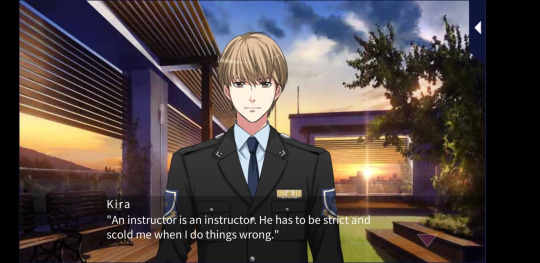



and here:
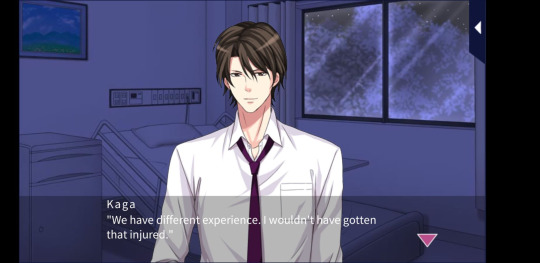
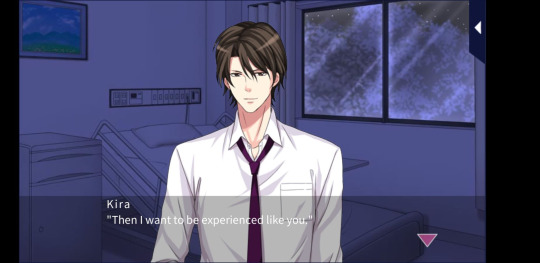
she does get down on herself at times, but look at the way that she humbly accepts her mistakes. sometimes she wallows on her mistakes, as anyone would, but look at the way she examines her failures and turns that feeling of inadequacy into motivation to work harder and smarter.
by the way, these screenshots are from his ms1 and ms2 - so pretty early on - and we get to see her learn from these mistakes because she’s allowed to make them. we also get to learn more about kaga’s strictness and his kindness because of these mistakes.
i don’t know if the whole refusal to allow rmd mc to make significant errors is a response to readers who are like “omg.... why are voltage mcs so weak, why can’t they be perfect women who never get anything wrong” but ANYWAY i just feel like they never confront or address her hubris properly.
3. following on from point 2, i find her one-dimensional. i’ve mentioned this before in a rant, but i don’t find her to be a very deep character bc to me, she reads as mostly surface level sass. i said: “her dialogue with them often reads as like they put 100 points in “snark” and 0 points in any other personality trait” lmao. so she’s great in one-off screenshots where you can see her bite back with a very screenshottable one-liner, but i find it tiring to have 30 chapters of her just literally running her mouth. because of this constant tone that they keep giving her, i find it really difficult to see any emotional depth in her character. because she’s the perspective character, her internal dialogue is just as, if not more, important as the love interest’s external dialogue in terms of carrying the emotional weight of falling in love, and i just don’t understand how there’s any sense of two people falling in love and getting to know each other when every sentence out of her mouth is just sass. can you imagine you meet someone and you get to know them but never have any genuine conversations bc every line out of your mouth is sarcastic? like your date is opening up and telling you about some difficulties he’s going through (which i’m sure you all know is a very vulnerable and scary thing to do) and instead of being empathetic and kind and understanding, you’re just like “sucks to be you dude”. and instead of saying “you don’t need to carry everything on your shoulders”, you say “you’re STUBBORN and i’m RIGHT”. OF COURSE i’m being kind of hyperbolic here (not even that much tho, see screenshots below) but that’s basically the tone she constantly takes.
so when takado opens up about the rina thing, instead of being like “oh shit i’ve been judging him all this time and i’m genuinely sorry because i didn’t know a thing about you and yet i’ve been running my mouth”, she says “your head is as hard as a rock ya know?” and then KEEPS GOING.







where’s the empathy sis? where is it? i’m looking but i can’t find it.
EVEN TAKADO WAS LIKE “I WAS TRYING TO TALK SERIOUSLY ABOUT IT”

and then the writers just push off her rudeness as like “it’s okay it’s chill!! takado laughed about it afterwards and it made the issue sound insignificant!!” even tho it’s obviously an extremely traumatic thing? WHY does he even fall in love with her??? i don’t UNDERSTAND alsdkfjs she has NO FEELINGS!! i just want genuinely romantic moments... is that too much to ask... it’s called romance md...
once again, let’s compare that to hlitf mc, when she finds out about kaga’s trauma. literally the FIRST reaction she has is to consider his feelings.

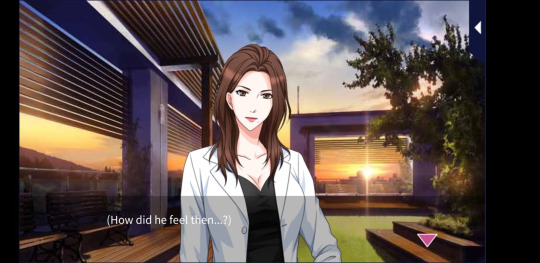
without even hearing his side of the story, she defends him because she trusts him and immediately empathises with him and the first thing she does is try to understand him and where he’s coming from.
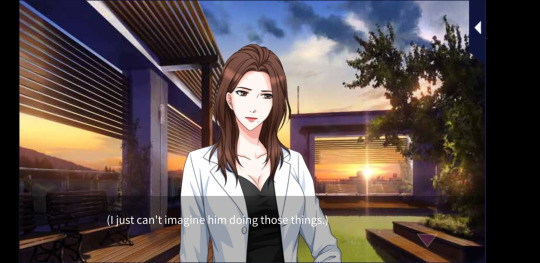


later on, when she hears him just dismissing things and playing callous, she actually cries on his behalf, which shocks him because he’s not used to people caring about him:
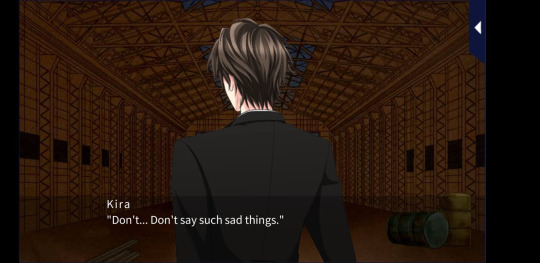
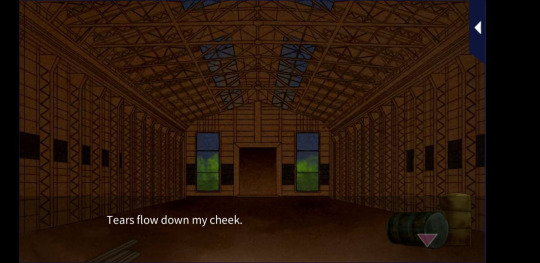
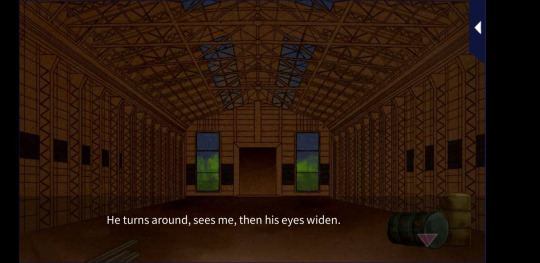
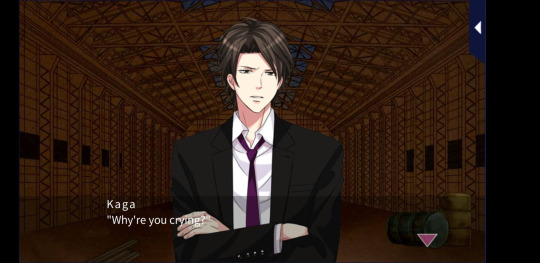
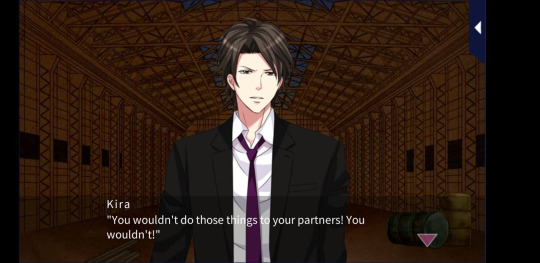

isn’t that a MASSIVE difference in reaction to essentially the same character opening up about their trauma? which do you find more conducive to developing emotional intimacy? in my opinion, it’s so much easier to fall in love with someone who supports you and has your back and trusts and believes in you and tries to understand you and can have a genuinely caring conversation with you when you need it. by the way, it’s not like kaga’s mc doesn’t sass him either! they have great bantery chemistry and she shit-talks him ALL THE TIME (a lot of the time under her breath and he’s like HUH? it’s great).
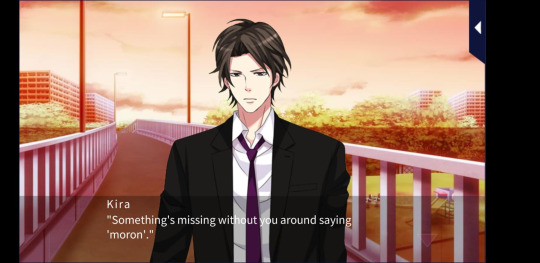
and yet... we still actively see her caring about him... instead of being like WHOOPS my tongue slipped, i can’t help that i’m naturally insubordinate ¯\_(��)_/¯
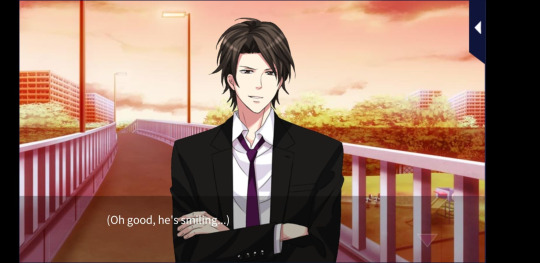
by the way, i’m not trying to put the onus on female characters/heroines to be caring/empathetic/kind/loving. i’m putting the onus on ALL characters to be caring/empathetic/kind/loving in their own ways if we’re supposed to be convinced that they’re falling in romantic love. sure, kaga’s mc is exceptionally loving but kaga returns that love with his own ALL the time ;~~; anyway i’m gonna stop talking about them for now bc otherwise i would just completely derail and keep going on and on about them.
anyway, back to takado, i actually find him to be more caring and loving than his mc? i actually genuinely like takado as a character and i think that real life me and him would be great together so i’m like extra offended that he’s with her rather than ME??? i would treat him so much better.
i consider this lack of emotional depth to actually be a bigger hindrance on my enjoyment of the game than the lack of flaws thing. voltage’s recent wave of mcs with the love choice titles have been trending towards the ‘perfect woman’ type of mc, but while i have some Thoughts(tm) here and there about the other protagonists, none of them strike me as being as hard to get along with as rmd’s mc. so i’ve mentioned my issue with the masukisu mc’s weird moral boundaries (more an overall voltage issue that manifests the most strongly in her character), but i also do find that they don’t let her make big mistakes and they present her as this perfect superwoman figure with no weaknesses which like... unrelatable. but at least her banter is flirty banter and there’s a lot of chemistry there (even if it’s sometimes lacking emotional depth, as in some of kazuomi’s scenes - and that’s not her fault, that’s 100% on kazuomi lol). you can definitely understand why they’re attracted to each other at least, and you can definitely see real, deep love form between her and yuzuru the most. even though the masukisu mc is a ‘perfect woman’, the premise is designed to spark relationship conflict and the writing really helps us understand the emotional turmoil of falling in love with a target because of how much it lets the mc dwell on it. destind too basically has a perfect mc in terms of work/career, but they let her have her very glaring weaknesses and, once again, the premise forces her to address her shortcomings with regards to her idealistic view on soulmates/destiny and explores the head vs heart thing where she has to really examine her emotions and how they potentially come into conflict with her preconceptions of and preoccupation with numerical compatibility.
thinking about it objectively, i feel like takado’s mc and mlfk ayato’s mc have a couple of similarities in the way that they don’t realise they’re in love for the longest time (although obviously childhood friends to lovers provides a better context for not realising that love - same with my boi natsume), but there’s just something lovable about mlfk’s mc that i don’t see in rmd. without going too deeply into it bc (1) i’m tired and (2) i’ve been going on about this for WAY too long now, i think that comes back to tone or writing (and possibly translation) style. i think at some point, i might actually go and compare the language in the “omg am i in love...?” scenes between takado’s mc, ayato’s mc and natsume’s mc but uh... not tonight haha.
actually, at some point, i genuinely wondered if rmd mc was aromantic. i really just thought she did not experience romantic attraction because i literally got no sense of it through her internal monologue bc they kept pushing the whole like “i only relate to people’s ~aesthetics~” thing. and then i wondered how they were going to make an aromantic mc fall in romantic love...? because... it’s an otome game? (btw i’m not saying that aro people can’t enjoy otoge, i definitely know people who do! but there’s a big diff between someone playing an otoge vs someone being a character falling in romantic love in an otoge. but please call me out if i’m misunderstanding aromanticism!). anyway, long story short, rmd mc (takado’s especially) falling in love is absolutely unconvincing to me because i find her dialogue - both internal and external - rather unfeeling.
these three points (1. translation that favours colloquialism over communicating emotional tone; 2. characterisation of a hubristic mc who doesn’t need to overcome significant challenges; 3. lack of emotional depth and empathy/understanding) are basically why i don’t think that she has good romantic chemistry with the love interests in romance md that i’ve read so far. i also have some very petty personal gripes (sekai...........) but they’re not relevant to this particular topic and frankly just... really petty so i don’t want to get into them here.
so anyway, long story short: i agree that i don’t think she would really vibe with kasumi in her current given state. like, they could be friends, maybe.
#romance md: always on call#rmdaoc#munechika takado#i'm... afraid to tag this#but i must do it to keep my blog organised so i can come back and find this#her love in the force#hlitf#hyogo kaga#voltage inc#otome romance#love 365#love choice#snow writes#meta#snow rants#that should be a new tag#voltage mc
15 notes
·
View notes
Text
Lesson 6 from arrogance to destruction
"Memory Text: “And He changes the times and the seasons; He removes kings and raises up kings; He gives wisdom to the wise and knowledge to those who have understanding” (Daniel 2:21, NKJV),
"In Daniel 5, the Word of God gives us a powerful example of human hubris that ends in a stunning and dramatic way. Though one could say that it takes Nebuchadnezzar a long time to learn his lesson, at least he learned it. His grandson, Belshazzar, does not. In using the temple vessels in a palace orgy, Belshazzar desecrates them. Such an act of desecration is tantamount not only to a challenge of God but an attack on God Himself. Thus, Belshazzar fills up the cup of his iniquities, acting in ways similar to the little horn (see Daniel 8), which attacked the foundations of God’s sanctuary. By removing dominion from Belshazzar, God prefigures what He will accomplish against the enemies of His people in the very last days. The events narrated in Daniel 5 took place in 539 b.c., on the night Babylon fell before the Medo-Persian army. Here occurs the transition from gold to silver, predicted in Daniel 2. Once more it becomes evident that God rules in the affairs of the world."
Belshazzar's feast:
"Read Daniel 5:1-4 along with Daniel 1:1, 2. What is Belshazzar doing that is so bad? How does it reveal his true character? Compare his actions with Revelation 17:4-6. What parallels can you find?"
"The king commands that the sacred utensils of the Jerusalem temple be used as drinking vessels. Nebuchadnezzar seizes the vessels from the Jerusalem temple, but he places them in the house of his god, which shows that at least he respects their sacred status. But Belshazzar turns the sacred vessels into drinking utensils in a most profane way."
"While drinking from the sacred vessels, Belshazzar’s lords “praised the gods of gold and silver, bronze and iron, wood and stone” (Dan. 5:4, NKJV). It is worth noticing that six materials are mentioned. The Babylonians used the sexagesimal system (a system based on the number 60) in contrast to the decimal system used today (based on the number 10). Thus, the six categories of gods represent the totality of the Babylonian deities and, therefore, the fullness of the Babylonian religious system. Interestingly enough, the order of the materials follows the order of the components of the dream statue of Nebuchadnezzar, except that wood replaces the clay. As in the dream, stone appears last; although here it designates the material composition of idols, stone also evokes God’s judgment upon worldly empires (see Dan. 2:44, 45), which Babylon symbolizes."
"This feast serves as an apt representation of end-time Babylon as seen in the book of Revelation. Like Belshazzar, the woman in endtime Babylon holds a golden cup and offers polluted drink to the nations. In other words, by means of false doctrines and a distorted worship system, modern Babylon lures the world into evil (Rev. 17:4-6), oblivious to the judgment that will soon fall upon her. One day judgment will come."
An uninvited guest:
"Read Daniel 5:5-8. What happens, and why does the king respond as he does? In what ways does this account parallel Daniel 2, and why is that parallel important? (See Ps. 96:5 and Col. 1:15-17.)"
"As Nebuchadnezzar does in previous crises (Dan. 2:2, 4:7), Belshazzar calls the astrologers, the Chaldeans, and the soothsayers to clarify the mysterious writing. And to make sure that they give their best, the king promises them extravagant honors: (1) purple clothing, a color worn by royalty in ancient times (Esther 8:15); (2) a chain of gold, which was a sign of high social status (Gen. 41:42); and (3) the position of third ruler in the kingdom. This last reward reflects accurately the historical circumstances of Babylon at that time. Because Belshazzar was second ruler as co-regent with his father, Nabonidus, he offers the position of third ruler. But despite the tempting rewards, the sages once again fail to provide an explanation."
"On top of all his sins, then, the king attempts to find wisdom in the wrong place. The Babylonian experts cannot uncover the meaning of the message. It is written in their own language, Aramaic, as we shall see tomorrow, but they cannot make sense of the words. This might remind us of what the Lord speaks through Isaiah: “For the wisdom of their wise men shall perish, and the understanding of their prudent men shall be hidden” (Isa. 29:14, NKJV). After quoting this verse the apostle Paul states: “Where is the wise? Where is the scribe? Where is the disputer of this age? Has not God made foolish the wisdom of this world? For since, in the wisdom of God, the world through wisdom did not know God, it pleased God through the foolishness of the message preached to save those who believe” (1 Cor. 1:20, 21, NKJV)."
"Some truths are too important to be left for humans to try to figure out for themselves. That’s why God, instead, reveals these truths to us."
Enter the Queen:
"Read Daniel 5:9-12. What does the queen say about Daniel that the king should have known already? What does it say about him that he seems ignorant even of Daniel’s existence?"
"As the banquet hall is thrown into confusion because of the mysterious message on the wall, the queen comes and provides direction to the befuddled king. She reminds the king about Daniel, whose ability to interpret dreams and solve mysteries has been demonstrated during the time of Nebuchadnezzar. If Belshazzar were as smart as his predecessor, he would have known where to turn to find the meaning of this mysterious writing. The intervention of the queen proves necessary for the king, who at this point seems utterly at a loss as to what to do next. Her words sound like a rebuke to Belshazzar for having overlooked the only person in the kingdom who can interpret the mysterious writing. And she also gives the king an oral résumé of Daniel: the prophet has the Spirit of the Holy God, light and understanding and divine wisdom, excellent spirit, knowledge; he is capable of understanding, interpreting dreams, solving riddles, and explaining enigmas; he was chief of the magicians, astrologers, Chaldeans, and soothsayers in Nebuchadnezzar’s time (Dan. 5:11, 12)."
"At this point, we again wonder why Belshazzar had ignored Daniel. The text does not offer a direct answer to this question, but we presume that at this time Daniel, after serving the king at least until the third year of his reign (Dan. 8:1, 27), is no longer in active service. One factor could be Daniel’s age. He is probably around 80 years old, and the king may have wanted to replace the old leadership with a younger generation. The king also may have decided to ignore Daniel because he did not want to commit himself to Daniel’s God. But whatever the reason or combination of reasons, it remains striking that someone with such a portfolio as Daniel’s could be forgotten so soon."
"Read Romans 1:16-32. In what ways do we see the principle expressed in these texts manifested, not just in this story but also in the world today?"
Weighed and found wanting:
"Read Daniel 5:13-28. What is the reason Daniel gives for the soon-to-come demise of this king?"
"Forced by the circumstances, the king resorts to consulting Daniel, but he seems to do so with reluctance. This may tell more about the attitude of the king toward the God of Daniel than toward Daniel himself."
"In turn, Daniel’s response to the king’s offer of reward says a lot about Daniel’s priorities and character. It also is likely that Daniel, knowing the meaning of the mysterious words, realizes just how worthless the reward really is."
"Daniel then indicts the king on three counts.First, Belshazzar totally has ignored the experience of Nebuchadnez-zar. Otherwise he would have repented and humbled himself like his predecessor."
"Second, Belshazzar has used the temple vessels in order to drink wine and to praise his idols. Here Daniel mentions the six kinds of materials used to make idols in the same order noted previously."
"Third, the king has neglected to glorify God, the One “who holds your breath in His hand and owns all your ways” (Dan. 5:23, NKJV)."
"Having addressed the failures of the king, Daniel proceeds to the interpretation. Now we learn that the divine graffiti consists of three Aramaic verbs (with the first repeated). Their basic meaning should have been known to the king and his sages—MENE: “counted”; TEKEL: “weighed”; and PERES: “divided.”"
"With the Medo-Persian army at the gates of Babylon, the king and the sages must have suspected some ominous meaning in that writing, but the sages do not dare to say something unpleasant to the king. Only Daniel proves capable of decoding the actual message into a meaningful statement in order to convey its full meaning to Belshazzar: “MENE: God has numbered your kingdom, and finished it; TEKEL: You have been weighed in the balances, and found wanting; PERES: Your kingdom has been divided, and given to the Medes and Persians” (Dan. 5:26-28, NKJV; emphasis supplied)."
The Fall of Babylon:
"Read Daniel 5:29-31 along with Revelation 14:8, 16:19, and 18:2."
"What can we learn about the fall of Belshazzar’s Babylon that points to the fall of end-time Babylon?"
"Whatever his faults, Belshazzar is a man of his word. So, despite the bad news, he is satisfied with the interpretation given by Daniel, which is why he bestows upon the prophet the promised gifts. It appears that by admitting the truth of Daniel’s message, the king implicitly recognizes the reality of Daniel’s God. Interestingly, Daniel now accepts the gifts he has refused before, probably because such gifts can no longer influence his interpretation. Besides, at that point such gifts are meaningless since the empire is about to fall. Thus, probably as a matter of courtesy, the prophet accepts the rewards, knowing all the while that he will be the third ruler of the kingdom for only a few hours."
"Exactly as announced by the prophet, Babylon falls. And it does so quickly; while the king and his courtiers drink, the city falls without a battle. According to the historian Herodotus, the Persians dug a canal to divert the Euphrates River and marched into the city on the riverbed. That same night Belshazzar is slain. His father, King Nabonidus, has left the city already, surrendering himself later to the new rulers. Thus, the greatest empire humanity has ever known to this point comes to an end. Babylon, the head of gold, is no more."
"“Belshazzar had been given many opportunities for knowing and doing the will of God. He had seen his grandfather Nebuchadnezzar banished from the society of men. He had seen the intellect in which the proud monarch gloried taken away by the One who gave it. He had seen the king driven from his kingdom, and made the companion of the beasts of the field. But Belshazzar’s love of amusement and self-glorification effaced the lessons he should never have forgotten; and he committed sins similar to those that brought signal judgments on Nebuchadnezzar. He wasted the opportunities graciously granted him, neglecting to use the opportunities within his reach for becoming acquainted with truth.”—Ellen G. White, Bible Echo, April 25, 1898."
Further thoughts:
"Large feasts were common in the courts of the ancient world. Kings loved to throw parties with extravagance and luxury to show their greatness and confidence. Although we do not know all of the details of this particular feast, we know that it took place when the Medo-Persian army was poised to attack Babylon. But humanly speaking, there was no reason for concern. Babylon had fortified walls, a food supply for many years, and plenty of water, because the Euphrates River flowed through the heart of the city. So, King Belshazzar sees no problem in having a party while the enemy surrounds the city. And he orders a momentous celebration, which soon degenerates into an orgy. What a powerful testimony to the hubris of humanity, especially in contrast to the power of the Lord. Through Daniel, God tells the king that despite the opportunities he has had to learn truth, “the God who holds your breath in His hand and owns all your ways, you have not glorified” (Dan. 5:23, NKJV)."
"“The history of nations speaks to us today. To every nation and to every individual God has assigned a place in His great plan. Today men and nations are being tested by the plummet in the hand of Him who makes no mistake. All are by their own choice deciding their destiny, and God is overruling all for the accomplishment of His purposes.” —Ellen G. White, Prophets and Kings, p. 536."
2 notes
·
View notes
Text
第1章
1: Rebirth - Wei Wuxian has died. This calls for a celebration!
‘Wei Wuxian has died. This calls for a celebration!’
Barely a day had passed since the great siege of the Luanzang Mound had come to its conclusion, and the news soon gained wings. It travelled far and wide through the cultivation world, spreading even faster than the flames of war.
For a while, the chaotic campaign of encirclement and annihilation, which had been led by an alliance of the Four Great Sects and assisted by countless other sects of lesser influence, was on everyone’s lips.
‘Why, indeed, that calls for a celebration! Which distinguished hero was it that managed to kill the Yiling Laozu with their own two hands?’
‘Who’d you think? It was his own shidi Jiang Cheng, the young leader of the Jiang Sect, who placed righteousness before family ties and spearheaded the Jiang Sect of Yunmeng, the Jin Sect of Lanling, the Lan Sect of Gusu, and the Nie Sect of Qinghe, to attack the Yiling Laozu’s lair at Luanzang Mound and completely wipe it out.’
‘For the sake of justice, I must say: what a well-deserved death!’
These words immediately elicited cheerful clapping and resonant calls of agreement: ‘That’s right, a well-deserved death indeed! If it weren’t for the Jiang Sect of Yunmeng kindly taking him in as a child and raising him, that Wei Ying would have spent his life as a complete no-name charlatan, drifting around country fields and low-class haunts.. What else is there to say? Even though the former head of the Jiang clan had raised him just like a real son, he brazenly defected from the sect and made the whole cultivation world his enemy, completely humiliating the Yunmeng Jiangs. To add insult to injury, he caused the tragic near-massacre of the whole Jiang family. Has there ever been a better example of a thankless wretch kicking his benefactors in the teeth? I don’t think so!’
‘It’s surprising that Jiang Cheng let that arrogant skivvy to live as long as he did. If I’d been in his position, I wouldn’t have let that bastard Wei get away with just a little stab wound when he defected. I would have just disposed of him and his little faction right away. If only he’d been killed then and there, he wouldn’t have had the chance to commit those deranged deeds later on, either. So what if they grew up in the same cultivation clan? When you’re up against a person like that, holding on to the innocence of childhood memories is a big mistake.’
‘That’s not the story I heard, though. Didn’t Wei Ying die because the demonic techniques he’d been cultivating turned against him, and his Ghost General underling tore him apart and devoured him? I heard he ended up nibbled to bits.’
‘Hahahaha.. That’s what we call karmic retribution. I always wanted to say that the Ghost General he raised was just like a mad dog on a loose leash - biting at any person it came across, and finally mauling its owner to death. Served him right!’
‘Be that as it may, had the young leader of the Jiang sect not depended on his knowledge of Yiling Laozu’s weak points when devising the plan to besiege and destroy Luanzang Mound, it’s difficult to say whether the whole thing could have succeeded at all. Surely you haven’t forgotten just what Wei Wuxian has on his hands - how he annihilated an army of over three thousand distinguished cultivators in a single night?’
‘Wasn’t it five thousand?’
‘Three thousand, five thousand, what’s the difference? Personally, I think five thousand sounds more likely.’
‘What’s for sure is that he was a frenzied lunatic..’
‘At least he destroyed the Yin tiger amulet before his death, accumulating a bit of yin virtue too. Had he left that ghastly thing behind to continue wreaking havoc on the human world, the burden of his sins would be even greater.’
As these three words - the ‘Yin tiger amulet’ - were uttered, a spell of silence suddenly fell over the gathering, and everyone seemed to be on their guard.
A moment passed, and someone sighed: ‘Ah, well.. The thing is, back in the day, Wei Wuxian was considered a noble son of one of the wealthiest and most distinguished cultivation clans - it’s not like he was never on the right track. He made his name at a young age, he was so well-regarded and free to do what he pleased. How on earth did he sink so low?’
The topic of conversation shifted, and one after another, voices were roused to proclaim their opinions once again.
‘This clearly shows that cultivation must, ultimately, follow the orthodox path. The demon fell astray from the path, and for a while he seemed invincible, all hubris and bravado. But hey, how did he leave the stage in the end?’
At that, someone bellowed: ‘He didn’t even leave an intact corpse behind!’
‘Not all the damage was due to demonic cultivation, either. In the final analysis, Wei Wuxian’s character was too flawed, and he brought the wrath of both God and men upon himself. What we call good and evil always get their rightful compensation in the end; Heaven’s reward is a good reincarnation..’
After death, all are free to pass judgment on one’s life. By and large, the same things were being repeated over and over again, with a voice of dissent occasionally piping up only to be immediately suppressed.
Yet a dark haze still lingered in all hearts, impossible to banish.
Wei Wuxian, the Yiling Laozu, had definitely died at Luanzang Mound; yet after the event, no one could summon what remained of his soul.
Perhaps his soul, too, had been devoured when the army of ghosts ate away his body - or, perhaps, it had escaped.
The former would, naturally, be a cause of universal delight and rejoicing. However, the Yiling Laozu could overturn the heavens and wreak havoc on earth, he could move the mountains and drain the seas - at least that was how the rumours had it. If he wanted to resist his soul being summoned, surely this would be like child’s play for him. If, one day, he were able to regain control of his spirit and possess a new body by force, all the cultivation sects - as well as the entire human realm - would surely be met with even more deranged curses and retaliations, sinking into a pitch-black reign of bloody terror.
So it was that, after placing a hundred-and-twenty stone beasts to guard the summit of Luanzang Mound, all the distinguished families began conducting frequent soul-summoning ceremonies and searching vigilantly for any signs of demonic possession, keeping track of strange phenomena occurring throughout the lands, and using all their might to remain on guard.
In the first year, there was only silence.
In the second year, there was only silence.
In the third year, there was only silence.
……
In the thirteenth year, the silence still remained unbroken.
By this point, more and more people had become convinced that Wei Wuxian may not have been so extraordinary after all - maybe he really had been extinguished in both body and soul.
Even if he had once been capable of turning the clouds upside down and covering the rains with his hands, he had become the one who was turned over, in the end.
No one can remain on the altar of the gods for eternity; and legends are just legend, nothing more.
(see translation notes)
7 notes
·
View notes
Text
The Riddle of the Sphinx as a Greek Tragedy
Warning – this essay includes spoilers (under the read more link)
It may be set in modern day Cambridge but in its referring to the story of the Sphinx of Thebes (and Oedipus) and its plot involving multiple revelations and betrayals, its exploration of revenge it deliberately calls back to the golden age of Greek tragedy, This is a point Steve Pemberton and Reece Shearsmith have commented on in interview, particularly to explain the episode.
As mentioned, the main story from Greek mythology that the episode references is Oedipus, specifically his banishing the Sphinx from Thebes by answering her riddle. However, it also references elements from Sophocles play ‘Oedipus Tyrannus/Rex’ and other Greek tragedies both in plot elements and how the narrative unfolds.
Firstly it is important to note that there are some major differences between this episode and Greek tragedies. For example there is no chorus commenting on the action and we see all the major action happen in front of us rather than key events happening off stage which then are relayed by a messenger, amongst other things (However it could be argued the crossword itself acts as a Greek chorus commenting on the action and as the messenger as it will tell others what has transpired between Squires and 'Nina')
However, there are a great number of ways in which this episode very accurately reproduces the practices of ancient Greek drama.
In Greek tragedy we usually see dialogues between two characters (Sophocles introduced a third actor, but we usually only see two characters interact in his and Euripides plays). We only see dialogue between Squires and Nina/Charlotte then Squires and Tyler. There are often long passages of exposition and monologues which are also echoed in this episode with Nina, Squires and Tyler all getting opportunities to explain what is happening.
The Riddle of the Sphinx (like many episodes of Inside No.9) conforms to the three Aristotelian unities for drama set out in in The Poetics. It has unity of action (it concerns Squires confrontation with Nina/Charlotte and Tyler with no subplots), unity of time (it occurs in real time over a half hour) and unity of place (Squire’s office). Indeed, almost two third of the episodes of Inside No.9 in the first four series also conform to these three unities.
The plot could be said to conform to three-episode structure of Greek tragedy with Squires and Nina/Charlotte’s initial interactions about crosswords being the first episode, Nina/Charlotte revealing her true motives being the second episode and Tyler’s arrival being the third episode. The Poetics also set out that a discovery should occur within a play and this certainly happens in The Riddle of the Sphinx!
The referencing of the myth of Oedipus in the story must be deliberate with Squires involvement with the death of his two children and sexual assault on a young woman who turns out to be his daughter echoing Oedipus unknowingly killing his father Laius and marrying his mother Jocasta.
Squire’s real crime like most characters in Greek tragedy is his ‘Hubris’ (ὑβρῐ́ς). This goes beyond our concept of pride or arrogance (both of which Squires is more than guilty of). In Greek Tragedy it is almost a form of blasphemy (certainly in the plays of Sophocles and Aeschylus) in that it is a form of disrespect for the gods and fate. Oedipus may be infamous for (unknowingly) killing his father Laius and marrying his mother Jocasta. But in Greek myth, this is not his actual crime. His and his parents were informed separately by oracles that Oedipus is fated to kill his father and marry his mother. They both take action to try and avoid this, but these actions only ensure that they occur. More pertinently it is flaws in all three’s personalities that allow these events to pass. All three act rashly or impulsively when told about the prophecy (Laius and Jocasta command baby Oedipus to be left to die, Oedipus runs away from his adopted parents). In spite of the prophecy Oedipus and Laius get into a violent argument when they encounter each other which leads to Laius’s death. So both had tempers that leads them to have violent arguments with apparently random strangers they encounter. Jocasta marries Oedipus almost immediately when he arrives in Thebes as a hero for having vanquished the sphinx even though she has only recently been widowed and he is quite literally young enough to be her son (despite the prophecy).
The plot of Sophocles’ ‘Oedipus Tyrannus/Oedipus Rex ‘occurs years into Oedipus’ rule of Thebes and concerns the eventual revelation of his actions. Throughout the play Oedipus behaves in high handed and arrogant manner toward all those around him, such as the sear Tiresias, in investigating the cause of the plague that has befallen Thebes and the circumstances of the death of Laius. He refuses to heed warnings of what he might uncover or that he may himself be the cause of the plague. This exacerbates his horror when his actions are eventually revealed. Jocasta kills herself offstage (hanging herself – with her scarf, rather like Simon had done) and Oedipus blinds himself.
It could be argued that Squires has his fate foretold him in Tyler apparently warning him that Nina/Charlotte plans to kill him. In trying to avoid this fate and not exploring why Nina/Charlotte wants him dead or Tyler’s motivation for telling him, he ensures his eventual death and that of his daughter.
Squires thinks he can outwit ‘Nina’ and that he will not be called to account for his behaviour toward others who have less power than him (Simon in the crossword quiz, the other young female undergraduates he presumably sexually assaulted). He refuses to show sympathy for those who have suffered because of his arrogance. In the end one of his victims, Tyler, will call him to account in the most horrendous manner possible.
Jacob Tyler in many ways acts in the role of the avenging god that we see frequently appear at Euripides’ tragedies (such as Dionysus in the Bacchae). These gods often reveal at the end of Euripides plays to the central figure the full consequences of their action and punish them accordingly. Tyler’s actions bring around the downfall of Squires and he exposes Squires hubris in his treatment of others. He could also be said to act as a Deus Ex Machina (a trope especially associated with Euripides) in supplying Squires with the bullet to kill himself with. However, these figures are frequently shown to be petulant and deeply cruel in Euripides’ dramas (particularly in plays such as The Bacchae and Hippolytus). Tyler is shown to be similarly cruel and petulant with no compassion toward Squires or even Nina/Charlotte who he raised as his daughter.
Jacob’s first name may be an allusion to Jacobean tragedy. Many Jacobean tragedies (also known as revenge dramas) were every bit as bloody and revenge driven as many Greek tragedies and undoubtably this was another influence on Pemberton and Shearsmith.
Professor Squires middle name Hector (revealed only at the end of the episode) may be another allusion to Greek myth. In the Iliad Hector was the Trojan warrior who kills Achilles’ companion Patroclus in battle. This evokes the wrath of Achilles (the stated theme of the Iliad) who in turn kills Hector.
One of the main themes of the Iliad and many Greek tragedies is ‘honour’ and its maintenance. Characters such a Medea are shown to go to extreme lengths when they perceive themselves as being dishonoured. Squires is determined to maintain his honour as a Crossword specialist over a young man even if it means cheating and abusing his position of power. Tyler feels he has lost his honour both by Squires cuckolding him and his resulting withdrawal from his promising academic career. Both men have an unhealthy preoccupation with their standing in the eyes of others and with being successful. Honour and excelling is linked to identity and power in Greek myth and is seen as almost conferring a form of immortality. The maintenance of honour becomes a deadly matter. Tyler can only see one way of restoring his lost honour- by avenging himself upon Squires and robbing him of his honour by exposing him to shame.
Nina/Charlotte has some interesting comparisons with two figures from Greek tragedy in Electra and Antigone. Electra and her brother Orestes’s killing of their mother Clytemnestra and stepfather Aegisthus in revenge for the murder of their father Agamemnon was the theme of plays by both Euripides and Sophocles (and the Oresteia). In Euripides’ play Electra’s desire for vengeance is met but she is then beset by guilt and regret. It is also worth notig that at least in Euripides plays Clytemnestra's killing of Agamemnon was in large part motivated by his apparent sacrifice of their daughter Iphigenia)
But Nina/Charlotte also has some parallels with Antigone, Oedipus’s daughter (who is herself the subject of a play by Sophocles). Antigone ensures her brother Polynices is given a proper burial after her uncle Creon expressly forbids anyone doing this. She is caught and punished by being entombed alive. Like Antigone, Nina/Charlotte is concerned with doing what she perceives as right by her dead brother. Her fate of being left completely paralysed while dying a slow death could be said to echo Antigone’s fate.
Alexandra Roach gives a powerful performance as Nina/Charlotte showing her fierce determination to avenge her brother and later her horror as the extent of Tyler’s betrayal become evident (all the more so as the character is completely paralysed – but her eyes speak volumes). She has been betrayed by both her ‘fathers’ (particularly Tyler) and her life has been lost as collateral in their power game. This echoes both Electra and Antigone having little power as women in their stories, a reflection of the highly patriarchal nature of ancient Athenian society.
There was always a clear moral purpose to Catharsis for the of any Greek tragedy. These were collective experiences whih deliberately explored religious and moral questions for the audience. To this end each play needed an act of ‘Catharsis’ (fear and pity) which Aristotle wrote was so critical to a successful drama. We get this act of catharsis. Squires is confronted with his role in the death of his two children (and the fact he assaulted his own daughter). Steve Pemberton manages to make Squires a pitiable character in the final moments of the episode. We see Squires is genuinely distraught at what he has done to Nina/Charlotte as he cradles her in her final moments. We pity Squires as a man who inadvertently destroyed the family he could have had if he had been more honest, less arrogant and less lecherous. We are also left with feelings of fear that people like Tyler are so ruthless in their quest for revenge and that our own misdeeds. The gunshot at the end resolves the action and ironically both Squires and the audience are released from the tension of the events of the episode.
The Riddle of the Sphinx may at first be nasty fun but as with much of Inside No.9 there is a moral message. Both Squires and Tyler behave in a toxic and entitled way which no one in the audience is supposed to admire. Squires may be physically destroyed by the end of the episode but Tyler is destroyed morally. Nina/Charlotte is so warped by a desire for revenge she is consumed (quite literally!) by it. All this in a story apparently about crosswords
#inside no.9#Reece Shearsmith#Steve pemberton#Alexandra Roach#Riddle of the sphinx#Oedipus#Euripides#sophocles
15 notes
·
View notes
Text
"A lesson without pain is meaningless. For you cannot gain anything without sacrificing something else in return, but once you have overcome it and made it your own...you will gain an irreplaceable fullmetal heart." - Edward Elric
In honor of disability month and the FMA 20 year anniversary I wanted to address some Thoughts™️ about the series.
It's not often you see a disabled protagonist in media where their disability is integral to the story without taking up their entire character, even more so with anime. Yet, Fullmetal Alchemist has not just one disabled Protagonist, but two. The Elric Brothers are an exemplary representation of disability in media that I find myself reflecting on often as a disabled person myself. If you haven't completed the manga or Brotherhood, skip this as it will be brimming with spoilers.
(Mangahood will be my point of reference because while 03 is good on its own merits it's not as fresh within my immediate memory, and I am far less familiar with it. Keep this in mind, I've watched FMAB 10 and a half times whereas I've finished 03 only once years ago.)
The story highlights their disabilities immediately, Edward being a double amputee and Alphonse being without his ENTIRE body, only having the senses of proprioception, sight, and hearing left. Yet, despite this being key to the story and an integral part of their characterization, it is only one facet of their motivations and doesn't take center in the narrative, which is refreshing. It's not inherently negative to make a narrative centered on the characters' disabilities, but often this model of a story goes very wrong very fast and starts to feel hollow (no pun intended). FMA avoids this by making their disabilities a clear part of the plot and their motivations without allowing it to consume the entire story, so the Elric Brothers don't suffer the "my disability is all of my character" problem that many disabled characters are relegated to in a vast portion of media, all while being strong and competent.
Recap:
The brothers wished to revive their mother, but their good intentions cannot change the atrocity of their mistake, Truth makes this abundantly clear from the start. Edward loses his leg first, a punishment for "stepping" into God's shoes and transgressing the place of humans in their world. Alphonse loses his entire body, unable to feel any warmth or simple comforts like food and rest, when all he wanted was to feel the warmth and comfort of his mother's embrace again. At first, Alphonse's entire being is consumed by the gate, but Edward acts immediately, refusing to lose his little brother and refusing to allow his arrogance in this plan to cause his brother's death for only following his lead. Edward gives his right arm to have the gate give back Alphonse's soul, and stated clearly in his panic that he'd give his entire self to save Alphonse if that's what it would take, but Truth took his dominant arm only, showing something akin to mercy, although the character of Truth is capriciously strict and hard to describe as "merciful".
Through giving up his right arm, Edward regains his Right Hand Man, his little brother and best friend. His only remaining family, who he feels responsible for protecting in the absence of their parents. He felt immediately that he'd made a grave mistake, instantly full of regret as he realized the gate had taken his brother. In that moment he was willing to give anything to take it back and undo the suffering his arrogance caused his brother, yet Alphonse was still to suffer more to come. Ed tied Alphonse's disembodied soul to one of Hohenheim's collected suits of armor, managing to at least keep his brother alive in some way. One could say that Alphonse's punishment functioned as a secondary punishment for Edward, showing him how easily his hubris could have cost him what he has left in his obsession with regaining what they'd lost, their mother. A very clear symbolic reminder of the weight of his actions and how he'd misled his brother in his own naive ignorance. Even in giving another limb away to drag his brother's soul back out of the gate, he couldn't offer enough to bring him back intact. Thus is the law of equivalent exchange.
Now that we've reviewed some of that basic symbolism and the motifs the story draws upon with limbs and body parts in relation to characters, let's move on to each individual brother and break it down, shall we?
Edward Elric is a very realistic protagonist, this is one thing a majority of us familiar with this series can agree upon. He feels like a believable teen boy, with layers of complexity to his character while also showing arrogance and immaturity that is unsurprising at his age. He expresses unwillingness to kill and avoidance of unjust violence from the beginning, and has a strong moral code after the ordeal of committing the taboo.
In some characters his cocky personality would typically become grating, yet the story explains in itself why he is this way, then builds upon this to develop him into an incredibly mature character who is willing to admit when he's absolutely wrong and adapts to new information and context for the crisis unfolding around him as it comes, even if he remains crass. This arrogance is shown from the start to be a manifestation of insecurity, self loathing, and repressed guilt. Edward is a logic driven person, he has a very unique thought process, which is where my interpretation of him as autistic comes in. Edward's awkward social demeanor, somewhat abrasive and cold approach to some, and his trouble coping with nonsensical societal structures all stand out in this way. Furthermore he clearly shows hyperfixation, hyperactivity, special interest, and infodumping behaviors that are all too familiar. He's picky with food (*cough* the milk thing), has very little filter and speaks his mind bluntly even if this can warrant conflicting responses, yet at the same time struggles with vulnerable emotions, and he is frustrated when his own routine or itinerary are interrupted by forces beyond his control. All of these things Scream autism with comorbid ADHD. Many traits are shared between the brothers, and I'm quite certain they're both on the autism spectrum based on behavioral patterns. Neurodivergence aside, Edward's physical disabilities are undeniable.
Despite his bratty persona, Edward is fundamentally kind and uncharacteristically gentle and soft around the edges for a shonen protagonist in many ways. He cries openly on many occasions even if he struggles talking about his trauma and burdens in words at times, he feels pain, grief, and compassion so intensely it throws him into action on a regular basis in the narrative. In this way he's also a fantastic example of non-toxic masculinity (though in other ways he has displayed more toxic traits, he's just a kid). He acts on his heart, even if he's led by his mind and logic in most things. His humanity, value for life, and care for others will always win over his logic, and he shows a sense of personal responsibility for doing the right thing even if it harms him in the process. Ed is clearly shown having ghost pains in his lost limbs which is honestly an interesting detail to include, I don't think I've ever seen that aspect of amputation shown in media aside from FMA. It's also shown that when Ed's automail arm breaks this is a HUGE problem for him, but he's also shown to be very good at working around this in difficult circumstances. He doesn't become completely helpless, even if majorly weakened.
Alphonse is an extremely lovable and compassionate boy, brimming with altruism and care for others. Even in his noncorporeal state he pursues a better future and he's not helpless by any stretch. Edward clearly states Alphonse is the superior fighter for example, and it's not just because of his armor body being so large. He's *talented*, that's a fact. Al is every bit as clever and capable as Ed, moreso in some ways, and I love that about his character *because* he's so clearly disabled. He has no sense of pain, he is completely incapable of sleeping, he can't eat, can't relax or find comfort, he can only exist and think. This causes him to overthink in all his time alone, this is debilitating. He clearly is absolutely sick of the loneliness this causes, and he often feels helpless though he's not. He has doubts and fears that consume him in relation to his armor body, he questions his own personhood, even. Yet, Edward is stubborn and staunch in affirming that no matter what he's dealing with, he is fundamentally still a human being that is loved and irreplaceable. Alphonse is powerful and his body gives him some advantages, but it also sets him back, and the brothers know this even when others claim Alphonse's state is somehow a good thing. I have hEDS, a disability that comes with advantages as well as the major downsides, so I can understand and relate to Alphonse here. I too am told my disability is a boon because of flexibility and because I'm less likely to fracture bones, but I'm twice as likely to injure my ligaments and joints, which people ignore.
The brothers are both disabled, both flawed, both show weaknesses, but they are competent, determined, and strong in their own right. They are rounded characters that exist for more than to be pitied or condescended to by able bodied characters around them. They put their entire being in everything that they do no matter what that is, and they don't know the meaning of giving up. These traits that they're made of truly make them a shining example of disability in protagonists for others to look to for reference when writing their own disabled characters.
Even though by the end Edward has regained one limb and Al has regained his body, this also doesn't just deus ex machina reverse their disability or make it go away. It's clear that Alphonse's body is weak and has to be rehabilitated upon recovery, and Edward is still missing his leg and bears the scars and pieces of the port from his automail arm. They weren't suddenly made able bodied upon recovering these things, they reclaimed what was lost through struggle and grit, but the narrative didn't give the impression that their disability in itself was something to be fixed, which is important. They wanted to recover their bodies, but this doesn't erase the effects of their disability.
It was about Edward atoning for leading Alphonse into their mistake and saving his brother from suffering further, it was about them proving they can keep moving forward no matter what, not about getting rid of their disability in itself or putting themselves down because of the disabilities. This, to me, as a mentally and physically disabled viewer, is so important. They achieve their goal, but this doesn't in any way erase or undo the effects of their initial losses, they find ways to adapt and move on but they're still affected and still disabled. They always will be. That can be so important to see in comfort characters, and as a disabled individual who's had both brothers as comfort characters since I was a child, their impact on my own journey is surprisingly tangible for fiction.
#fmab#fullmetal alchemist brotherhood#fma#edward elric#alphonse elric#elric brothers#character analysis#disability month#disability positivity#disabled#fma 20th anniversary
122 notes
·
View notes
Text
The seasons in RWBY, literary archetypes and predictions for the next volumes
As we all know, RWBY is a show that is built around taking in established narrative and character archetypes, layering them, tweaking them and/or ultimately subverting them. One of its core narrative and symbolic elements are the seasons, so it seems only fitting that they’d take inspiration from and implement established overarching seasonal archetypes (in terms of tone and narration) to the plot.
One of the major works in terms of archetypal literary criticism that deals with the seasons has to be Frye’s. Frye proposed that the totality of literary works constitute a “self-contained literary universe”. Since we’re watching a show whose whole premise is having every single myth, legend and fairytale coexist in a single universe, with characters sometimes alluding to multiple myths at once, I’d hope this sounds uncannily familiar.
Frye divided all literary framework into four categories: comedy, romance, tragedy and satire. What sets Frye apart from the other critics is that he linked each category with a season. He posited that literary works were how humanity assimilated the outside world and nature at large, which is how those four types of plot structures correspond to the four seasons in the cycle of the natural world.
What does that mean for RWBY?
If, as I suspect, each narrative arc corresponding to one of the four continents in Remnant - with each continent symbolizing a season - aligns with the genre and plot structure defined by Frye, then we can make more or less accurate predictions as to the direction and themes of the two remaining arcs (as well as some of the plot points).
So, first we’ll see how the first two arcs, Vale and Mistral, hold up to the Frye scheme.
As I said earlier, Frye aligned each genre with a season:
-Spring is comedy, with themes of (re)birth and resurrection of the hero. The subordinate characters attached to this genre are the mother and the father.
-Summer is romance, because both are representative of culminations in the human journey, summer being the conclusion of the seasonal calendar, and romance ending with achievement and triumph, usually in the form of a union or marriage. The subordinate characters here are the companion and the bride.
-Fall is tragedy, with themes of demise, dying god, violent death, sacrifice and isolation of the hero. The subordinate characters are the traitor and the siren.
-Winter is irony/satire, with themes of darkness, dissolution, the return of chaos, and the defeat of the heroic figure. The subordinate characters are the giant and the witch.
Going off this, and knowing that each kingdom in Remnant is representative of a season, we can divide the RWBY narrative into 4 respective arcs, each assigned an archetypical narrative structure:
- Vale is Fall, meaning the Vale arc is a tragedy. Now, I know that your knee-jerk response to this would be disbelief especially with the tone set by V1-2, but here’s the thing: team RWBY aren’t the protagonists of the tragedy. Ozpin and Pyrrha are. We’re basically seeing the tragedy unfold from its supporting cast’s POV.
Once you go back through V1-3 and reread the plot through Ozpin’s and Pyrrha’s POVs, linking up the scenes having them as a focal point together (especially Ozpin’s), the tone changes drastically and it aligns perfectly with the beats of a classical tragedy. As early as V2 you get to see Ozpin growing steadily more isolated (isolation of the hero) as he loses the support of Ironwood and the Council, we see him get irreversibly dragged (and dragging our main cast and Pyrrha with him) into an inevitable confrontation, because of his complacency and passivity (fatal flaw) that ends with Pyrrha’s sacrifice, Penny’s violent death and his demise.
Pyrrha being literally based on a tragic hero, her story fills every single beat of a tragedy, V1 establishing her innocence, inexperience and righteousness, V2 being her high point but also pointing out her “fake” invincibility (thus her fatal flaw), V3 having her grow isolated and then sacrifice herself while staying true to herself and what she stood for (completion of ideal).
One thing to clue you in about Ozpin being one of the Vale arc’s tragic heroes is one of the first things Cinder tells him: “Such arrogance.” Ozpin thus dies for said arrogance, which is basically the moment when a tragic hero is punished for their hubris.
- Mistral is Spring, meaning the Mistral arc is a comedy. Don‘t think about the tone, think about the themes. And sure enough, Mistral was all about the resurrection of our heroes, both literally (Ozpin reincarnating) and figuratively (each member of Team RWBY dealing with the aftermath of V3, growing individually and culminating in them getting back together stronger and a lot more anchored in their respective roles, Yang’s resurrection is as unsubtle a callback to the phoenix’s as it gets tbh). The subordinate characters of a comedy are the mother and the father, and this arc’s primary supporting cast and driving narrative force was without a doubt the parental figures: Taiyang, Raven, Jaques, Ghira and Qrow. This arc was about our heroes going from under their guidance to challenging it, thus getting more agency and control over their own destinies. In this aspect, Mistral is both a rebirth and birth for Team RWBY: their rebirth as individuals after the loss they experienced at the end of V3, and their birth as their own people, as full-fledged heroes, going from the supporting cast of the tragedy of Vale to the main cast of this arc.
Now that we have established that there is enough of a basis to assume the RWBY arcs do in fact build up on the Frye scheme, what does it tell us about Atlas and Vacuo?
-Atlas is winter, so Atlas is irony and satire. We can expect this arc to articulate itself heavily on social commentary; I fully expect the faunus cause and the rising military dictatorship to be the focal points of said commentary.
The subordinate characters of satire are the giant and the witch. The witch refers to Salem of course, our resident Wicked Witch of the West, but I also doubt team W.T.C.H’s name is coincidental, so it refers to them as a whole as well. I think by the time the Atlas arc is in full swing, all of team W.T.C.H will be there. There is another witch we’ve lost track of for a while now that this could be applied to, and it’s Glynda (though I fail to see a narrative purpose to her appearance as of now, but I feel the need to point it out just in case).
As for the giant, CRWBY has proved time and again how they’re prone to using the same theme/archetype both literally and figuratively, and this time will be no exception.
Figuratively, both Jacques Schnee and James Ironwood could be called giants, Jacques as an industrial tycoon, Ironwood as an increasingly dictatorial military leader. Moreover, Ironwood’s name quite literally refers to a place in Norse Mythology where giants were born. As for Jacques, his myth basis Jack Frost is thought to be based on Norse mythology giants. But Jacques could have links to another myth:“Jack the Giant Killer”. Quite ominous, isn't it?
You see, one of the typical examples of irony in archetypal story-telling is actually the tale of Goliath vs David, where the giant is prodded by a cool and observant but almost invisible enemy into a blind, stampeding fury and then pushed to its own demise. Which, incidentally, follows the exact same beats as the “Jack and the Beanstalk” fairy tale, where Jacques Jack, a poor man climbs the social ladder through a loveless marriage a beanstalk to a land high in the sky (Atlas), steals into an enormous castle (the Atlesian academy slash military enrollment grounds), robs special treasures you’d never find anywhere else (the relic) and causes the death of the giant who owns it.
What I’m saying is, I expect Jacques Schnee to go full turncloack and align with Salem and W.T.C.H, help them steal the relic and propel Ironwood’s (self-)destruction, in return for them giving the SDC ground to prosper and it being fully sanctioned by the new regime (as in, everything Ironwood is not doing rn), if not putting Jacques himself at the helm of Atlas. Jacques is a ruthless businessman first and foremost afterall. Give him good enough a deal, and he’ll sell all of Atlas over as long as he profits off the trade-off.
And well, as far as irony goes, will there be anything more tragically ironic than Ironwood driving himself in a frenzy, growing increasingly more paranoid under both real and imagined threats, needled by the infiltrated team W.T.C.H and Jacques, until he triggers the fall of that which he so desperately was trying to protect all along. I think Ironwood dies here, and Jacques being on team villains means a 3-way Schneebowl is coming, Weiss vs Winter (who’s 100% team Ironwood) vs Jacques, and I think the outcome will be devastating for everyone involved but especially Weiss.
As for the literal part of the giant allusions, well. It has been a while since we’ve last seen these goliaths, and it seems too good an opportunity to pass up for CRWBY:
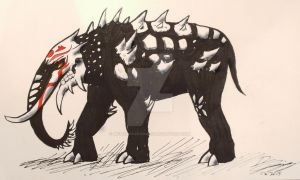
Or they could hit us with giant mecha structures à la Star Wars, a project G.I.A.N.T that Watts is all too ready to hack into and turn against the Atlesian military. I’d keep my eyes open for any giant allusions in Atlas’ arsenal, chances are they’ll be playing an active role plot-wise.
Which brings us now to the themes. As stated above, the main themes of satire are darkness, dissolution, the return of chaos, and the defeat of the heroic figure. We can surmise that Atlas will be the lowest point in RWBY. Frye goes as far as link winter to “Götterdämmerung myths” aka the fucking Ragnarok. Wiktionary has a second definition for Götterdämmerung which is a “cataclysmic downfall or momentous, apocalyptic event, especially of a regime or an institution”, so yeah we’re going to see the Atlas regime full on collapse as chaos takes over in there. Team RWBY will experience its must crushing defeat. My guess would be that, after Mistral establishing Ruby’s powers and having them bring a note of hope to the narrative and the upcoming battle against Salem, Atlas will be about the limits of those powers. I think Ruby is about to face the reason Summer died and lose to it, aka the Fenrir of this Ragnarok but this is a whole other theory I might delve into in a separate post since this post is already running too long and Atlas and its connection to Norse Mythology deserves to be delved into in detail. But yeah Atlas will be on SOME shit, my dudes.
-Vacuo is summer, so Vacuo is a romance. The subordinate characters here are the companion and the bride, so basically the lovers are at the center of the narrative here. As far as RWBY goes, 3 pairs of lovers have thematic and narrative importance: Salem and Oz, Jaune and Pyrrha and Yang and Blake.
So now that the Adam subplot was carried to an end in Mistral, and after the narrative centers more around Blake, gives the Faunus cause more depth and prepares her for her future role as a leader in Atlas, what does that leave Bumbleby with narratively in Vacuo, especially Yang? The one remaining hanging thread by then will be Yang/Raven, which prompts me to believe the bees will be confronted to their foil as a relationship, a.k.a Taiyang/Raven, making the latter the fourth lovers pair to mark this arc.
Taiyang and Raven coming back into the narrative at this point means we’re gonna get insight about another lover of Taiyang’s, Summer. I think Vacuo is where we’ll get all the answers wrt to Team STRQ, and after witnessing for ourselves how she died in the Atlas arc, we’ll get flashbacks of how she lived in the Vacuo one, which will be the thing to propel Ruby again after losing heart in the wake of the absolute apocalypse I expect Atlas to be. I also think CRWBY would get a kick out of having Summer be a major narrative force of the summer arc in the story.
I personally am a believer of the Spring Maiden!Yang theory and I think there’s enough set-up for it, mainly:
The fact that out of all the students at Beacon, the only contenders for the Vytal Festival by the end were Pyrrha and Yang (who only got disqualified because of the Mercury ordeal)
The way Yang is always set up as the strongest out of team RWBY
Raven was established as a foil to Blake but V5 establishes her as a foil to Yang, which culminates in their confrontation at the vault
The part of her confrontation with Raven where she establishes that not only is she stronger than Raven, but readier to face Salem and thus more fit to have the Maiden powers, which is why she’s the one that retrieves the relic from the vault. Raven might be the one to open the vault but she never gets inside. CRWBY could have had the confrontation happen after Raven retrieved the relic from within but they didn’t and I think it’s significant how Yang is the one allowed inside the vault and to handle the relic first, as if it’s always been her rightful place.
Which means I fully expect Raven to die at this point of the narrative. There’s a part of their confrontation where Yang tells Raven about the version of her Tai told her about and the one she’s always held out for, and she asks her if she killed her, too. It’s the thing that strikes Raven deeply and completely shatters her composure as she finally runs out of excuses and has to face herself and what she’d become. I think it’d be symbolically powerful to have Raven align with and die for the just cause, thus resurrecting that version of her.
For the remaining two pairs of lovers, Salem/Oz getting a conclusion in the last act of this story comes as no surprise, as for Arkos...tbh I don’t really see anything there (yet).
As for the themes, summer is for triumph, the messianic hero defeats the enemy who is associated with winter, darkness and moribund life (if there ever was a way to perfectly describe Salem this is it). Summer ends with an achievement, usually a marriage.
Now, out of the four pairs of lovers precited, I wonder who the ones getting constant and consistent development still and all throughout the story, are both alive by the end and have been shown to get growing awareness of their deepening feelings could be?
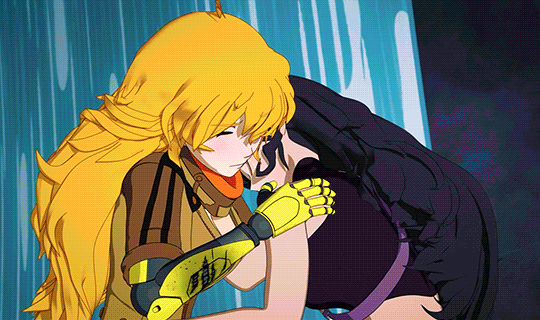
I wonder...
;)
P.S: not saying the bees get married married but yeah I expect them not to get their kiss till Vacuo. I think too much will be happening in Atlas (V7-9) for them to actually get together so they’ll be in this...limbo of not-really-lovers but definitely-more-than-friends and we’ll see them getting increasingly closer (they’ll prolly also blueball us big time with grade A pining) but again I did not expect Adam to die as quick as Mistral so who knows
#rwby#rwby6#rwby7#rwby predictions#james ironwood#ruby rose#yang xiao long#blake belladona#weiss schnee#jacques schnee#my meta
596 notes
·
View notes